
























Wishing you a very happy New Year! The year 2022 mattered a lot too, for the continuing shocks and volatility and challenges: From the invasion of Ukraine to the rise of Covid in China, from inflation to climate change these ordeals and a lot more have set us along a new path and have also shed light on the three major tipping points affecting the future of our country:
First, reversal of the country’s youthful demography by 2055
Second, the dangers of climate change.
Third, the prospect of large sections of society finding themselves free from wants and choosing to remain idle, especially so with the maturing of fourth generation technologies like digital, nano, bio and machine learning, and the increasing fusion of cyber and physical space
...No matter what happens elsewhere around the world.
Macro stability and continued reforms will ensure that once the ongoing global storm passes, India will be raring to go!
Rather than worrying about the problems in store for 2023, a more constructive strategy would lie in strengthening the country’s economic foundations so as to achieve the best possible economic outcome no matter what happens elsewhere around the world. Macro stability and continued reforms will ensure that once the ongoing global storm passes, India will be raring to go!
The impact of economic, political and public health events of the past few years is still visible. While some parts of the world are grappling with economic slowdown, other parts are witnessing increasing socioeconomic disparities. Climate change is striking all over: Europe is experiencing heat waves; the Atacama is blooming; and unseasonal flooding in major cities, like, Bengaluru Sustainability is under threat Business leaders are re-assessing their impact, including on the environment. Still, they need to ask difficult questions and make tough choices
Is it possible to pursue both growth and sustainability? By reducing emission and investing in sustainable and green processes and technologies, business leaders can do their bit to restore the health, happiness and harmony of people and the planet. By practicing responsible leadership, leaders can begin implementing this change within The future of business lies in nurturing organizations that can give back to the planet and help make it a better place.
In this context, MMA organized a unique event on “Leaders in Making,” “Becoming Powerful and Unlocking Your Potential,” and much more Watch the videos and read the articles on these discussions in this issue.
MMA has scheduled a number of events in January relating to de-carbonizing India; for instance, (i) charting a pathway for sustainable growth, (ii) towards a green economy and much more. Please watch the experts share their insights on how to reduce emission and invest in sustainable growth to restore the health, happiness and harmony of the people and the planet Tamil Nadu as a
The Chief Minister of Tamil Nadu has set a goal of
becoming a trillion dollar economy by 2030. This is an excellent aspirational goal. Tamil Nadu’s GDP this year is expected to be equivalent to $ 0 31 Trillion To reach the goal set by the Chief Minister, the state has to triple the size of its economy. A strong growth over a sustained period can happen only in a stable economic environment In this context, I am delighted to present to you in this issue the insights shared by the Finance Minister of Tamil Nadu Dr Palanivel Thiaga Rajan during the 4th R K Swamy Memorial Lecture delivered on the theme “Shaping Tamil Nadu Towards a Trillion Dollar State” at MMA. Please click to watch the video and read on the article in this issue.
After three years, Covid is still alive and kicking in China. It is a foregone conclusion that cases will spread across the world With our array of different vaccines of proven efficacies, effectiveness, safety and lasting immunity, India is prepared to counter any spike in new infections. However, there must be emphasis on booster doses, increased genomic surveillance, screening of passengers at airports and basic prevention protocols. With the New Year and many
Tamil Nadu’s GDP this year is expected to be equivalent to $ 0.31 Trillion. To reach the goal set by the Chief Minister, the state has to triple the size of its economy. A strong growth over a sustained period can happen only in a stable economic environment.
festivities around the corner, one hopes that the rise in cases in China does not cause problems We need to be safe and remain alert, particularly considering the fact that the true picture hardly emerges from China.
Resolution for 2023!

I don’t have a single resolution for the New Year! Am I worried? Absolutely not, but no more resolutions. It’s not that resolutions are inherently bad It’s that they rarely help you achieve your goal
I love this quote from Maya Angelou: “You can’t know where you are going until you know where you have been ” This could not be more apt when looking at my past resolutions You don’t need to wait till the New Year to take small steps towards becoming better individual. On the other hand, keep watching MMA events and read on Business Mandate to achieve your objective!
As the year draws to a close, we would like to thank you for your unflinching support and encouragement year after year. We will continue to remain your trusted partner when it comes to anything related to Management We will work with renewed vigour and focus on best practices/insights on latest management thoughts to enhance your professional competence. We assure you that we shall maintain an “Arjuna Eye” borrowing a phrase from the Governor of the Reserve
Bank on your professional needs and well-being to be a high performance individual
We urge you to constantly send in your feedback positive ones as well as criticisms, both equally important inputs in enabling us to get better at what we do
Thank you for your great support. You are the adrenalin that pumps us to reach greater heights.
As always, we would be happy to hear your views, comments and suggestions
Happy Reading And a brilliant New Year!!!
With the New Year and festivi‐ties around the corner, one hopes that the rise in cases in China does not cause problems. We need to be safe and remain alert, particularly considering the fact that the true picture hardly emerges from China!
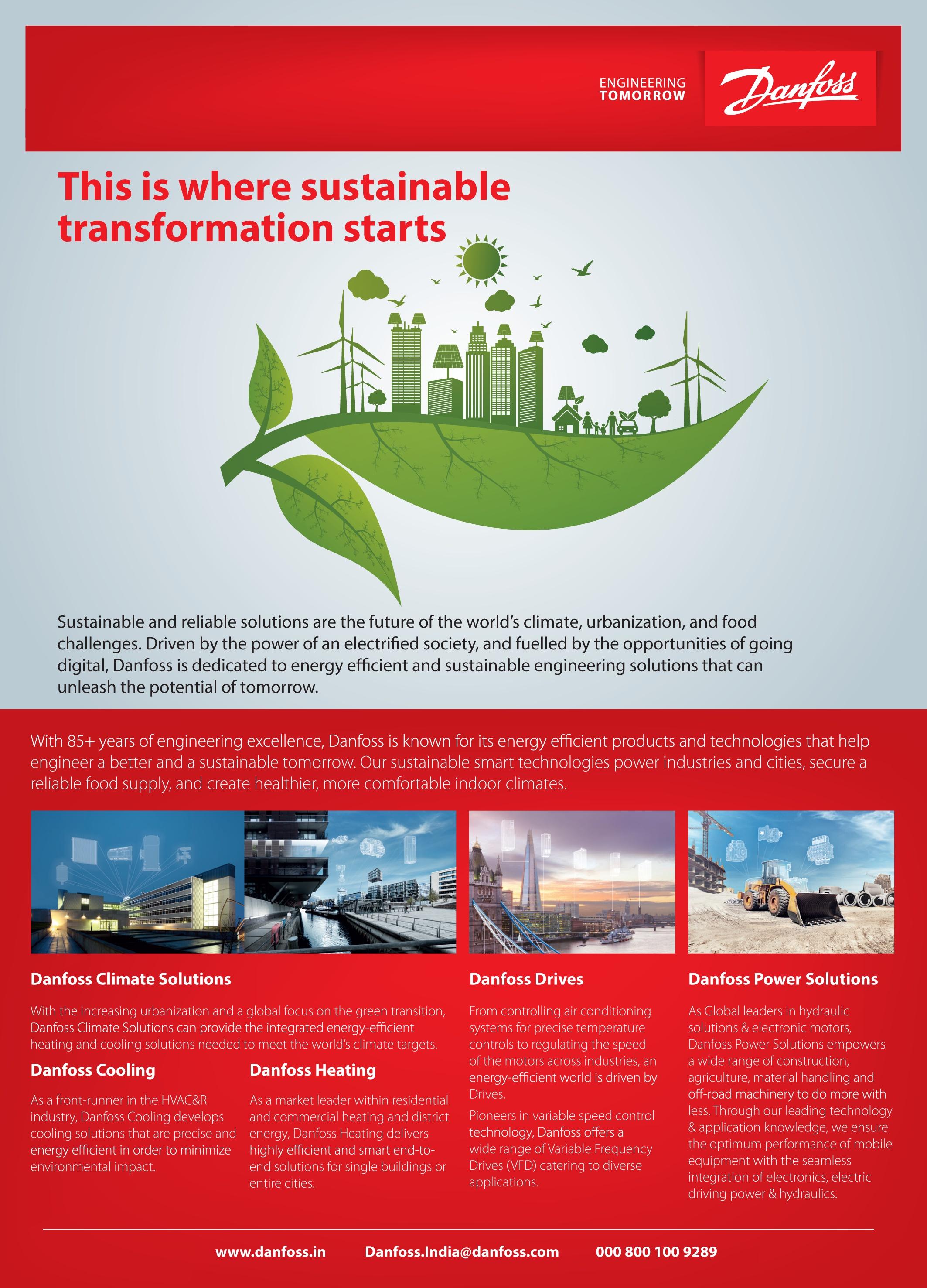
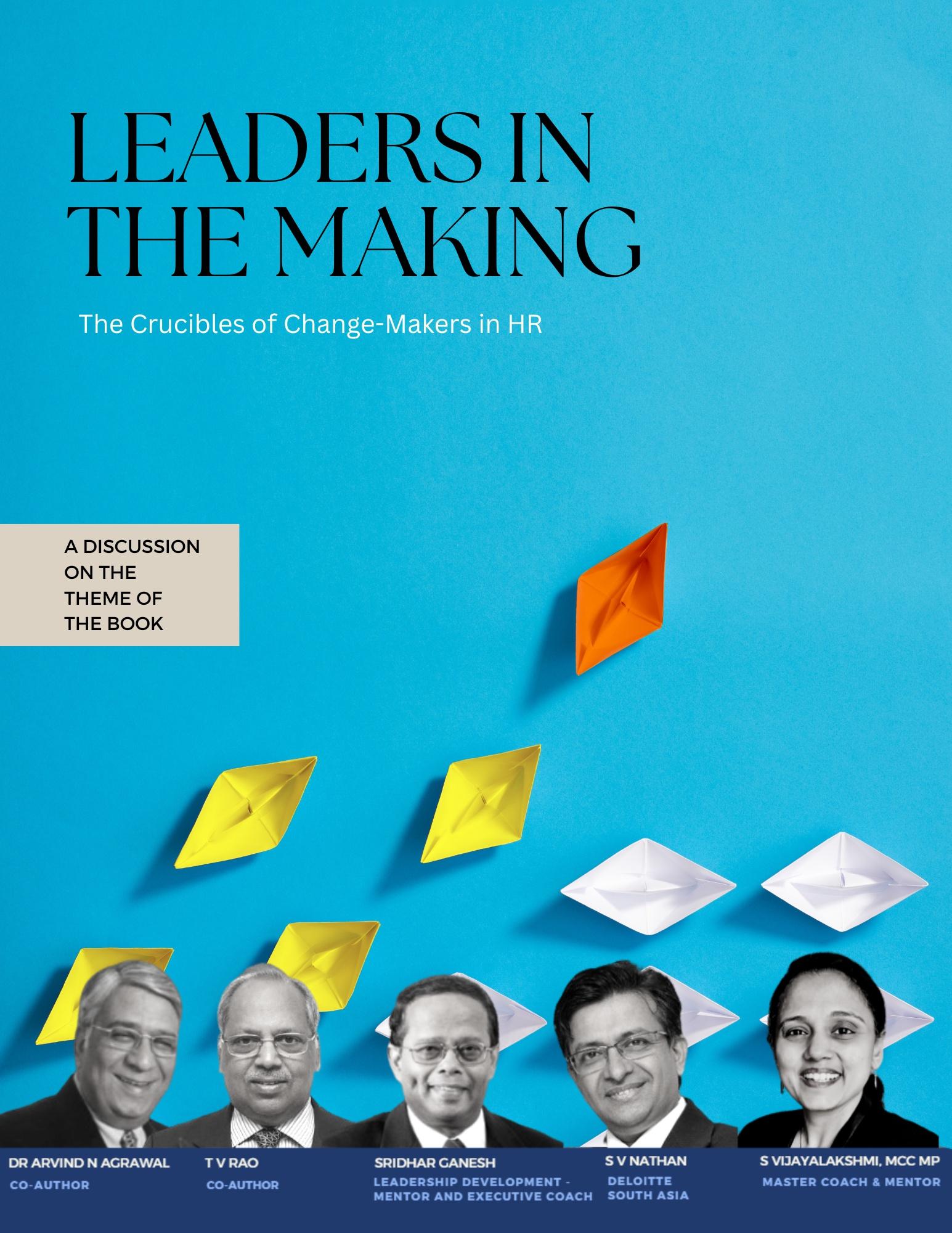
A discussion on the theme of the book “Leaders in the Making The Crucibles of Change‐Makers in HR” authored by Dr Arvind N Agrawal, Managing Partner, Lead Associates & Former President, NHRD and Mr T V Rao, Chairman, T V Rao Learning Systems The discussion with the authors was led by Ms S Vijayalakshmi, MCC MP Master Coach & Mentor
Ms Vijayalakshmi: What was your vision for the book? As co-authors, did you intuitively share the same vision?
Dr Arvind Agarwal: To be honest, I didn't have any grand vision I had just some childlike curiosity I had rubbed shoulders with many super professionals in HRD forums. I used to always wonder, ‘What are they really like? What has been their life journey?’ I would love to write about it I also thought that since these are super professionals, their stories would be inspiring for young professionals in their career journey.
Mr T V Rao: For a professor, teaching and learning continuously is the only vision I can think of So I was looking for learning from the HR leaders and then passing on the knowledge. And that's what we're doing through this book learn and disseminate.
Can you highlight the essence of this 462 page book?
Dr Arvind: We have been touched in our lives by a lot of people in our journey parents, friends, teachers, bosses and even professional bodies like MMA That's
how we have become who we are. The book is all about those experiences in the life journey like how you have been impacted? By whom? In what moments? What were those points of inflections? What choices did you make?
Mr T V Rao: The first lesson is, leaders make themselves by learning from various other people and experiencing both positive and negative crucible
One remarkable thing we discovered is that more than what teachers teach in a class, the way they treat students outside the class and connect with them makes a lot of impact. That is a big lesson.
~ Mr T V Rao
experiences. They convert each crucible moment into an experience, learn not to repeat mistakes or learn from both mistakes and good things Each one uses other people’s experiences, which include family as a source of learning, which they acknowledge only much later.
One remarkable thing we discovered is that more than what teachers teach in a class, the way they treat students outside the class and connect with them makes a lot of impact. That is a big lesson. The bosses largely have positive impact but you also learn from bad bosses. Nobody designates people as leader. But once you assume leadership position, you start contributing in a big way to the society Leadership is not really impacting people in your organization but people around you also. There are about 14 different categories of lessons that we have drawn. Two words hit you when you go through the book. One is crucible and the other word is baking.
Dr Arvind: I read a work by Warren Bennis and Robert Thomas. They talked about crucibles of leadership and that resonated with me I thought it would be great to discover what crucibles of experiences HR legends have gone through. So that was our inquiry. Crucible, in the medieval time, was a vessel used by the alchemist to convert metal into gold That was not an easy process. Likewise, when you go through life experiences, in that moment, it may be violent,
It was an overwhelming experience for me personally. I had known most of the people featured in the book. But in the process of talking to them over six hours, I realized how little I actually knew them...
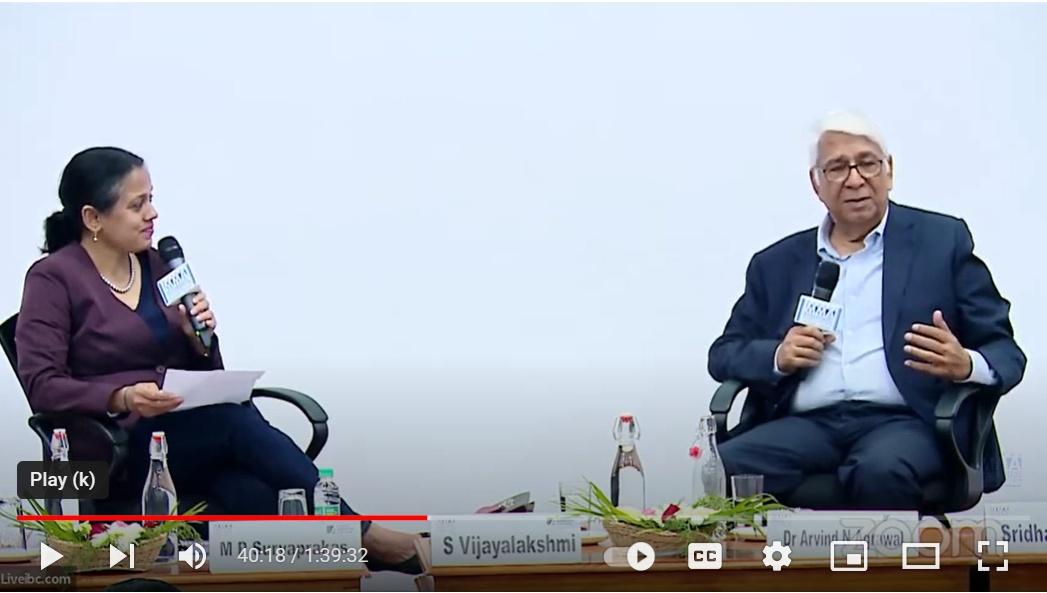 ~ Dr Arvind
~ Dr Arvind
unpleasant and sometimes positive But much later, when you look back, you realize the importance of it and lasting impact it has left in you. That's the shaping of the personality, the character and the mind of the person That connected well with both of us Once we heard the stories from HR leaders, we cherry picked their crucible experiences and analysed them.
I think even the last three years of the pandemic have seen huge, global crucible experiences for all of us. Hopefully, humanity has emerged better. You have featured 30, impactful, inspiring and heart-warming narratives of HR leaders. Can you share some learning from that process of having deep conversations?
Dr Arvind: It was an overwhelming experience for me personally I had known most of the people featured in the book. But in the process of talking to them over six hours, I realized how little I actually knew them, perhaps not more than 10 to 20% The second is, all of them unconditionally responded to my questions and gave me time. You have identified the settings of the crucible experiences and presented them in 14 categories, ranging from family to volunteering to social causes. Could you talk to us a little bit through some interesting revelations, as you put together those categories of experiences?
Mr T V Rao: If you go sequentially, first it is dealing with the childhood and parents We had leaders who were born in a variety of backgrounds. So one lesson is, it doesn't matter what family you're born in, but it matters what kind of values, examples and socialization parents have given you, even in difficult times Second is the impact of teachers, schools and colleges. We have leaders who have come from top institutions like IIM or the XLRI but we also have leaders who have studied in not-so-well known institutions but still made it big. But having said that, I think it is not the institution
itself, it is some of the faculty in the institutions who seem to matter Some of the leaders recall even today, the kind of impact the faculty had on them, both in the school as well as the college. So if the professors gave you an assignment or a project where they asked you to go and work with the poor, or the labourers or study the beggars and things of that nature, it leaves a great impact. So teachers make a phenomenal impact.
Third, one can see the importance of the first job Sometimes some of them get very routine kind of tasks but they have got the best out of it. Like if you're asked to maintain attendance of people or you were asked to look at the employee records, the person may treat it merely as a routine job But understanding that maintaining attendance register and employee records is the best way to know the entire organization, is another way of looking at it So, how people treat their first job creates an impact. Bosses who mentored and understood you also make an impact. People who handled industrial relations in the early part of their life seem to have learned quite a lot, which we were discounting earlier.
In fact, many times I've said HRD is separate from industrial relations I used to say HRM is equal to industrial relations plus personnel management plus HRD. But today, I have come to the conclusion that all three are integrated. There is no HRD without both IR as well as personnel management Contribution to professional bodies like National HRD Network, ISTD, NIPM and to social causes has helped people to grow.
Dr Arvind: One additional thread that we picked up, apart from everything that Mr T V Rao has already said is the power of immersive business experience Out of 30 people we have featured in the book, there were 17 people who had accountable business role, at some phase in their career Either they would have come from
f o u n t a i n h e a d o f e x c e l l e n c e

business role into human resource or they would have gone from human resource to business. Listening to their stories, the importance of business experience equally comes out very strongly So if people want to build their career in the HR profession, they should definitely look for industrial relation experience and equally for some business system, if they can
What were the surprises or revelations in what you have narrated as HR Legends’ competencies?
Dr Arvind: Our approach was unique. Mostly around the world, when people do any competency mapping, they will do behavioural interviews and from that, they conclude the other competencies. Our approach was that from the stories of HR legends, we have culled out what their competencies are To our surprise, the findings resonated well with the popular competency models of human resource. Whether it's SHRM, CIPD of UK, Bill Wooldridge model or NHRD network's own model HRSCAPE, the findings align very well Only one new dimension which came up and which we don't largely find across other models is the social relationship and its importance. Aspects such as being mindful of larger causes, giving back to the society, making a difference in the lives of other people came very prominently, right through the 30 stories.
Mr T V Rao: I strongly recommend every HR manager
to take some time off every year and work with an NGO or work for a social cause In many conferences, I keep on repeating this. A little bit of a surprise is why is it that except for some leaders, most of them wait till they reach 50s or 60s to become socially more conscious I wish the future leaders do it much earlier in their life
The other most interesting competence is the HR leader’s integrating ability. They are not merely HR leaders but leaders in their own right and could have handled any other leadership role with ease because of their HR background or orientation. They have an ability to integrate business with larger causes, put things in a larger perspective and talk of contemporary issues like work and its meaning, life and its meaning and so on.
Can you list out the top three to five HRM values that stood out for you?
Dr Arvind: Trustworthiness comes on top, followed by integrity, authenticity, respect for people and connecting with others.
Mr T V Rao: I may add openness, collaboration, proactiveness, confrontation and experimentation
One of the limitations you have acknowledged is the number of women HRLs who are featured—just two out of 30. Is there a larger issue out there that we need to acknowledge as professional bodies and as industries?
Mr T V Rao: The larger issues are always there. We have moved a great deal, but we still have a long way to go Recently, we had a reunion of IIMA 1982 batch after 40 years of coming here. Nearly 100 of them came but there were only about seven or eight women. This speaks something about what was happening between 1982 and 2022 Dr Arvind and I have started encouraging some people. A group of them in in Bangalore have volunteered to undertake the task of writing the next part of this book on women leaders
Our approach was that from the stories of HR legends, we have culled out what their competencies are. To our surprise, the findings resonated well with the popular competency models of human resource.
~ Dr Arvind

Dr Dr Arvind N Agrawal also led a conversation with Mr Sridhar Ganesh, Leadership Development Mentor and Executive Coach and Mr S V Nathan, Partner and Chief Talent Officer, Deloitte, South Asia & National President, NHRD.
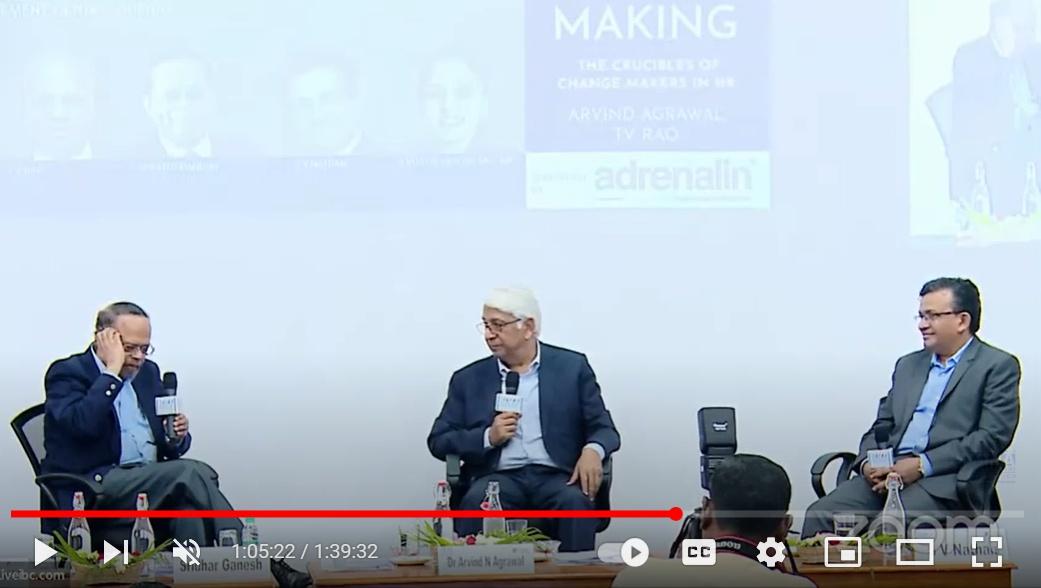
Dr Arvind Agarwal: Sridhar. You were a Calcutta boy, going through a very prestigious St. Xavier’s college. You mentioned that you were very much influenced by French/ Belgian Jesuits. What has been the influence of the people you met in St. Xavier’s?
Mr Sridhar Ganesh: I was very fortunate that I studied in a local, Tamil society school. Then I moved on to St. Xavier's to do my Physics. What impressed me about the Jesuits was they were very simple, extremely humble, had tons of knowledge and were hugely committed to their cause. They would go to any extent to help a student. For example, in my case, there were
some books on subjects like heat and electricity, which were extremely unaffordable for me. They would lend them from their personal library on only one condition make sure that you return it They were so supportive You have also talked about the influence of other teachers as you grow further in your education. You went to IIM Calcutta and chose HR as a profession. What made you choose HR?
Mr Sridhar: I was enamoured by two things One, the quality of my teachers. They were all stalwarts. In those days, it was not even called HR. It was called Personnel Management I was enamoured by what they had to offer and the science of psychology and people science. I could relate to it and it sort of touched me and therefore, took it up as my career.
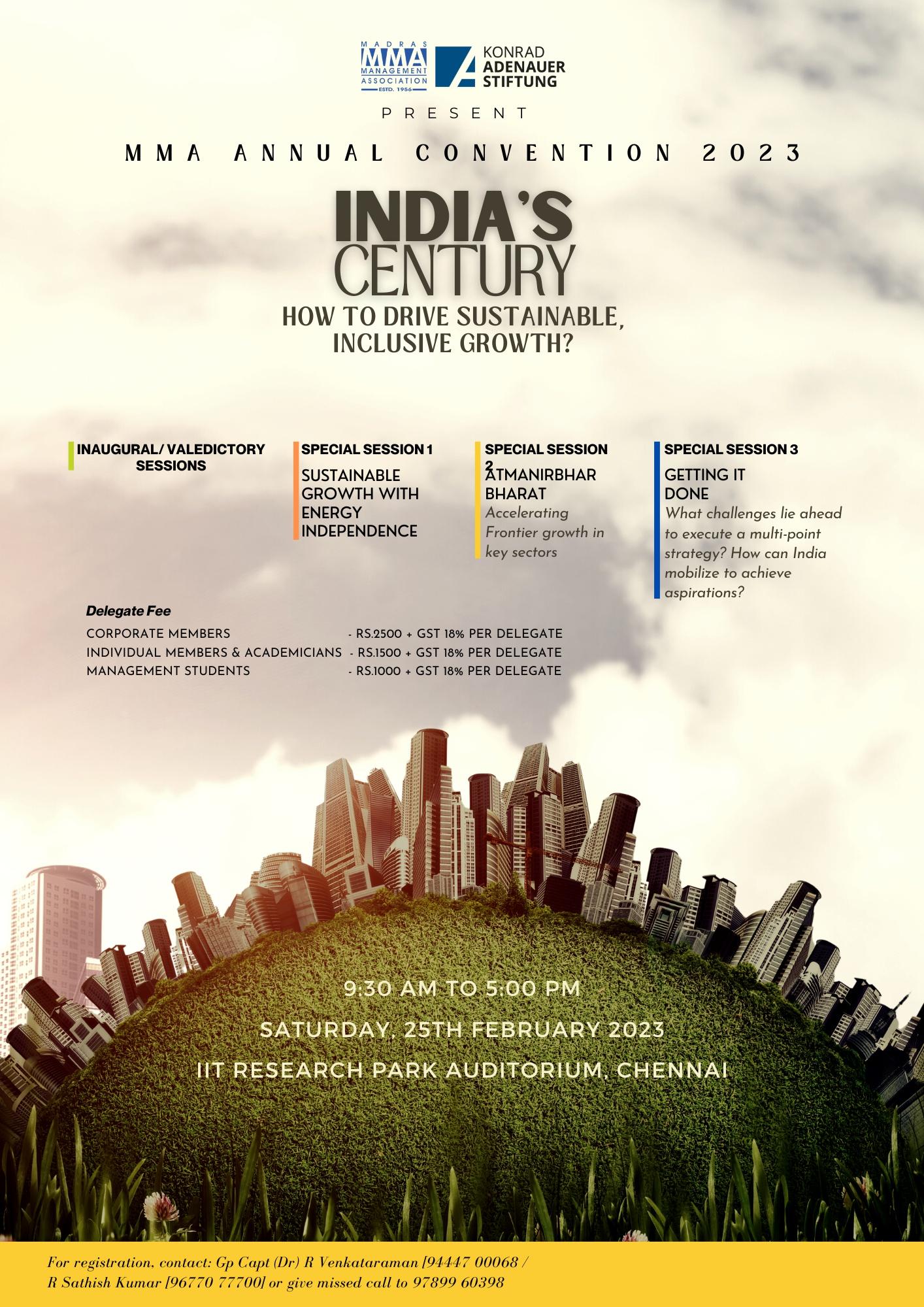
I was enamoured by what they had to offer and the science of psychology and people science. I could relate to it and it sort of touched me and therefore, took it up as my career.
~ Mr SridharNathan, you studied in The Steel City at XLRI. What are your impressions of XLRI that seems to have produced a large number of HR legends?
Mr Nathan: XLRI is a great place. It teaches you three things. One, service before self. The second thing is, most of the professors we had, built in us a sense of values, without seemingly so The third one is to be industrious. You have to work very hard.
and said, “Subbu You now get an A You don't have to attend any of my classes But if you want an A plus, you must write the exam.” Subbu never came to the class again. I remember as if it happened yesterday. Sometimes we just overbake things If there is something which is already done, then don't do that more. You both are serial authors. Can you share one or two messages that you would like to give to the people here today?
Mr Sridhar: Be driven by a sense of purpose. In HR, we tend to be very insular Employee connectedness is very important. That's where everything of a business rests. The third thing is being business aware. Most HR people are not even aware of what the company's revenues are or what EBITDA means People should become be more immersive in the business of the company.
If you were to think about one or two impactful teachers from whom you really learned something, which even today you remember and apply in your profession, what would be that?
Mr Nathan: There was an old lady professor by name Neelima Acharya. She taught industrial relations and we would be bored to death But I remember she once made a statement: Every management gets the union it deserves. I applied that in many walks of my life. You only get what you deserve because of what you do. That was a very powerful statement for me There was another professor Professor Gangopadhyay
He taught statistics which is not an easy subject. He was a cerebral professor. There was Subbu, a student in our class, who was very brainy and very good in mathematics One day, as the professor was writing some very complicated mathematics finding out the inverse of a matrix, I think, Subbu walked to the board and solved that Immediately the professor stopped him
Mr Nathan: All of us have a story waiting to be told. It is important for us to say that story Sometimes we discount ourselves I don't think there is any need for us to do that. Second, they say data is oil and all that. Personal data is worth nothing. So share and care. In the eight hours that we spend in office, the fact that somebody listened to me shows that somebody cares for me and my story. The third one is, we do a lot of ground work. But somebody else maybe doing a lot more than what you're doing So have respect for that
It doesn't matter whether you work in a multinational or you work in an Indian company, as HR professionals. Multinationals take extraordinary people. Many times, they falter at the altar and don't get the best of results. They could do much more. But Indian companies take the so called ordinary people and get extraordinary results out of them It is all about getting the best out of yourself and others



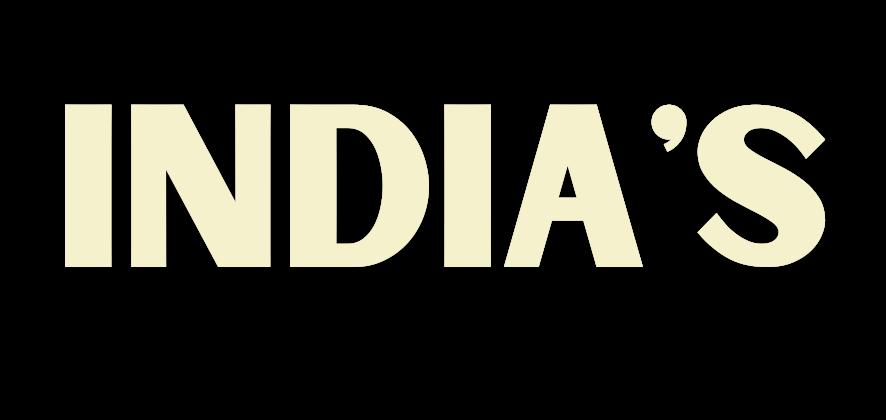
















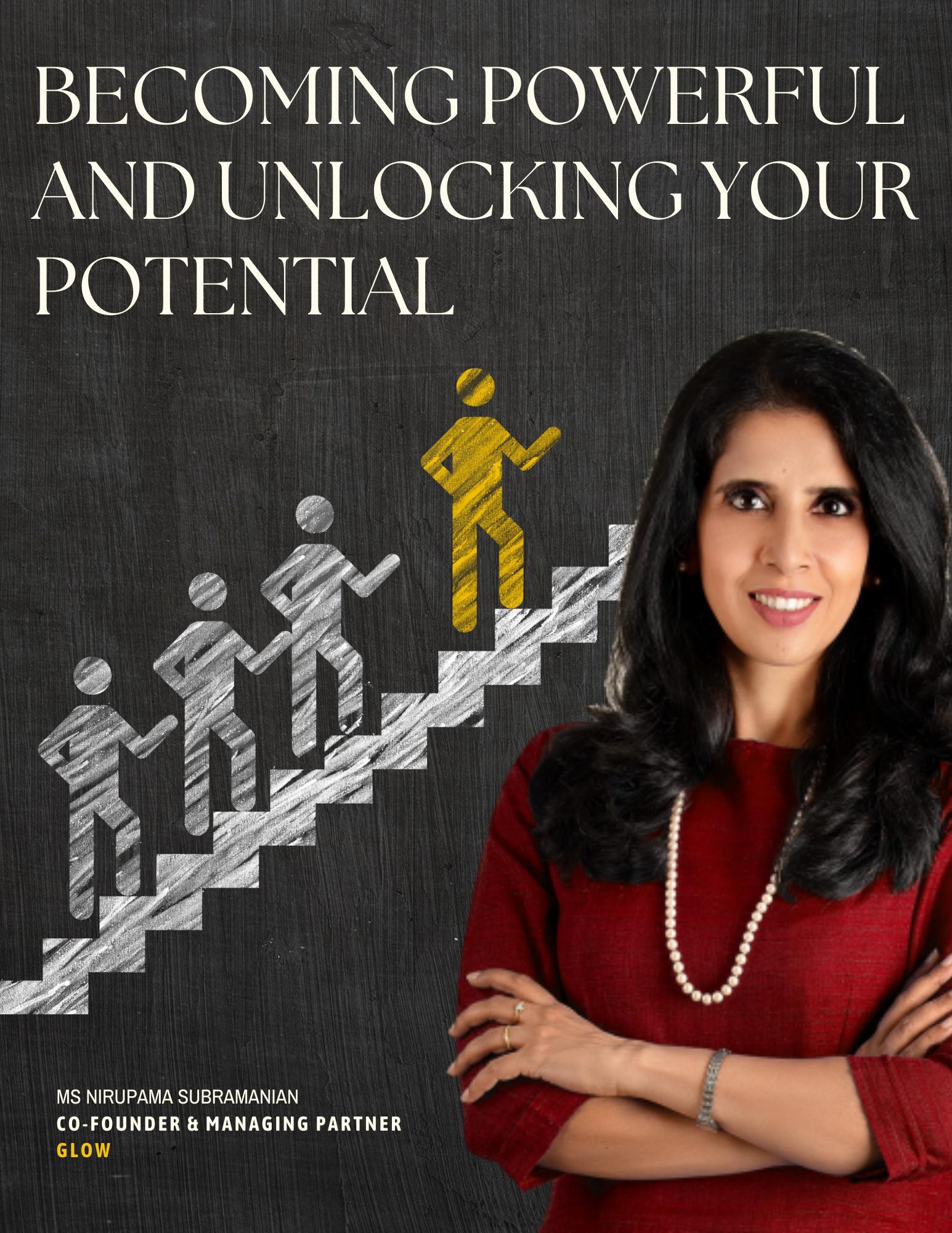
Ms Nirupama Subramanian, Co‐Founder & Managing Partner, GLOW & Founder CEO, Powerfulife, in conversation with Ms Mythili Chandrasekar, consumer behaviour and brand strategy enthusiast In this discussion, Nirupama shares her thoughts on what it takes for a woman to break different barriers and mindset.
Mythili Chandrasekar: A few months ago, I heard you speaking at a forum on archetypes of women and power and about discovering your own power. You have done a leadership role and consulting and coaching with 25,000 people across 75 organizations, and I presume, majority of them are men. What are your overall experiences in leadership and coaching? What are the big themes emerging today? Where does power fit into all this? What is the difference that you see in a woman ' s path to leadership versus a man ' s path to leadership?
Nirupama Subramanian: I finished my MBA from XLRI long ago in 1994. I joined the corporate world, stayed there for some time. Now I serve the corporate world by leadership coaching Most of my participants have been men There are three significant differences in the leadership journeys between men and women.
The first is career intentionality. When men join work, they join with the intention of sticking through They have to rise to the top and stay there till they retire. So it's almost like, there’s no option. Women enter their career with much less intentionality. They
don't usually enter the workforce thinking they have to stick out there till the end. They enter thinking, “I'll do my best Let me give it a shot Later on, we'll see what happens ” That hasn't changed significantly in the last 25 years. More women are entering now but we also see a big drop off at a later stage.
Secondly, women don't really focus on career impact, which is focusing on building your brand, networking and doing all the things outside your core job. Women don't do this, again, very intentionally. We have a lot of biases in our own mind about boasting and putting ourselves out. We think, “It won't look nice talking about my achievements or I don't want to be seen ” There's a lot of social conditioning Women are not as forthright in doing what is called office politics
The third is the big thing we call as work-life balance or prioritizing. There is a lot more responsibility that women carry about domestic
responsibilities. This creates guilt, conflict, exhaustion and burnout If they get support, it's almost like, “I'm so lucky that I have a supportive spouse; a supportive in-law. So I'm able to focus on my career.” This is the reason why many women drop off. The ‘3M’s that impact women are Marriage, Motherhood and Mobility
How do you define power? How do women approach power? How can we discover our power and realise our potential?

Women's empowerment is a catchphrase. For some reason, that annoys me, as it seems as though we are waiting for somebody from outside to empower us I started doing some reading and research on power as part of my leadership development. When we say powerful, it's usually something big and strong and being masculine There are three kinds of power The positional power is what you get from being a CEO, a Prime Minister, a professor or a parent. We also get discretionary power because we are born into a particular family or a race or in a majority religion or
as a male, etc These powers can be taken away once the context changes The third category is personal power. To become more powerful, I need to redefine what power means. I need to understand how I have been kept powerless That is the way my work with ‘Powerful,’ started
People, especially women, are kept away from power, by what I call the four D strategy: Deter, Diminish, Decorate and Divide. Deterrence is by using
There's research that women don't apply for promotions unless they feel they're 100% sure. The act of diminishing people, unintentionally or intentionally, keeps them from power as well.
the threat of punishment Eg If you cross the Lakshman Rekha, you are in great danger Not only men, women themselves do this to other women. We keep people feeling small and from doing the things they want to do, through punishment
The second strategy is ‘Diminish ’ People are distanced from power if you make them feel less confident. In the fairy tales, it’s always the woman who needs to be rescued Even many learned people have said that women are incapable of learning science or doing medicine; women's brains are smaller, they are too emotional and so cannot be effective leaders. Micro aggressions like this make women feel they are not as capable and confident There's research that women don't apply for promotions unless they feel they're 100% sure. The act of diminishing people, unintentionally or intentionally, keeps them from power as well.
The third strategy is Decorate. This means rewarding people for behaviors that align with what is expected of them A woman is expected to be a good girl, an ideal Indian woman, traditional, conservative, modest, caregiving, the perfect wife, daughter or mother, an employee who doesn't talk but sacrifices If we are perfect, we get rewarded If not, we are made to feel that we are good at nothing. Seeking that label of being perfect, keeps women feeling constantly exhausted Women themselves unwittingly become watchdogs of the patriarchy The fourth is ‘Divide ’ We always see in the television soap operas, stories of divide between mother-in-law and daughter-in-law. They are never shown as bonding together We prevent other women from succeeding and are judgmental of other women. These are the four strategies.
When I was working many years ago in Citibank, I always thought that I would not be able to manage such
a stressful job if I had a family because I saw very few women role models. Later on, when I continued working after my daughter was born, I felt guilty After my daughter fell ill, I felt very guilty that I was not at home. So I quit my full-time job because it was so ingrained in me that I had not been a good mother
So what are the options? What can we do? This is happening to us on a daily basis So one of the sources I found was what we call archetypes I read a lot about archetypes from the work done by Carl Jung and Freud. Archetypes are nothing but stories and patterns. We know how a hero has to behave We know how a mother has to behave So archetypes are very strong images and patterns that are deeply ingrained in us. They also depend a lot upon culture and context. I started looking at them as sources of power and energy In India, we do this very normally and easily. If you want wealth, you pray to the Goddess of Wealth Lakshmi. Saraswathi is an archetype of knowledge Because most of the work has been done by Western men, I wanted to bring terminologies that Indian women could relate to and draw power from, especially since there have been so many biases and stereotypes around these archetypes
We know how a mother has to behave. So archetypes are very strong images and patterns that are deeply ingrained in us. They also depend a lot upon culture and context. I started looking at them as sources of power and energy.
I want to share a model, which I call the ‘Six Feminine Power’ model. When I did interviews with women and through my coaching work, I saw there were six distinct archetypes I have given them names that connected with me and which a woman can easily connect to. The six archetypes are: Kanya, Apsara, Veera, Rani, Ma, and Rishika
Kanya is the good girl She is loyal, optimistic, devoted, beautiful, responsible and positive. She is the epitome of the good daughter and good wife and she is a very powerful person But the flip side of Kanya is, sometimes we see her as weak, suffering and not asserting her authority. We believe Sita was powerful, but she still needed somebody to come and defend her. This energy or power, at the flip side, makes us feel lost, submissive and docile. It might not help having too much of this energy.
On the contrary, Veera, is the warrior energy, the energy of being bold, courageous, having fighting spirit and taking risk. But historically, this has not been an energy associated with women. We've had very few women warriors In our mythology, women were not allowed to fight Draupadi never went to war Only last year, the National Defence Academy allowed women cadets. We need Veera to be leaders, to take leadership
positions and to take charge of our lives Similarly, all the other sources like Rishika (The wisdom seeker), Rani (The noble queen), Ma (Nurturing caregiver) and Apsara (The seductive beauty) can be strong sources of power for us But we have stereotypes and biases that prevent women, for example, from accessing education.
I have a 21-year-old daughter and am very proud of her. She was brought up to think no less of herself than a boy. When I speak to some of the girls whom we support, we still see that when the family has limited money, they would rather educate a boy than a girl So it continues till today that the pursuit of knowledge or wisdom is not something women should aspire for. In my book, I have spoken about the story of Avvaiyar As a young girl, she wanted to go into a spiritual mode and write and sing songs. She couldn't do that as a young girl She got married, became an old woman and only then pursued her Rishika energy
We feel that women cannot be beautiful and intelligent at the same time. I created a psychometric assessment tool which is the only validated psychometric assessment for women in the South Asian context. You can take this and find out what your powers are. I am a high Rishika and I have a lot of Kanya Interestingly, I found my Ma energy a little low After this self-awareness, you can start working to actively build your power, which you feel you need in a particular situation.
We can do that through affirmations and by changing our mindset to self-belief. We have to work on the body to feel confident and powerful as well I've been doing yoga for nine years and I find it very useful
You can access your personal power, even if you don't have positional power, to take up leadership roles. You can become a leader in your own mind and start seeing yourself as a powerful person.
in taking very specific actions You can access your personal power, even if you don't have positional power, to take up leadership roles. You can become a leader in your own mind and start seeing yourself as a powerful person Martin Luther King says that power is the ability to achieve purpose For me, power is wholehearted living, where I can live truly feeling and honouring all my strengths and qualities. So this is a framework for women to access their power and overcome any roadblocks.
Apsara is the energy of being openly expressive, as seen in the dancers, the celestial nymphs, the free spirits and people like Marilyn Monroe They are flamboyant An interesting personal story is that my apsara energy was quite low. It was very easy for me to write my book ‘Powerful’ because of Rishika energy. But it was not easy for me to market it I really hesitated to get onto Instagram or social media till last year because I don't want to do videos. But I have a purpose and I want to take this message So one of the things I started doing was becoming more active on social media by accessing my apsara energy and overcoming the blocks that I had. So more and more women and of course men can know their power and find out how they can support the women in their lives. What is the fundamental belief in this model?
Be true to who you are and your core power. Access other powers as needed for you to be more successful, happy and less stressed It is about achieving the optimum balance
happens to be a woman She was having a lot of trouble managing her team We found out that she was very high on Ma energy and she was very care-giving and nurturing. She used to be very relaxed and lenient with her team members She would keep on their work on herself, thinking that this was her role as a leader She was not getting the results that she wanted as she was overdoing it. She did not take care of herself and was going through burnout
We suggested that she needed to balance her energy. She shouldn't give up her empathy, compassion and caring nature but she needed much more of veera energy to be able to take charge and speak up for herself She also needed apsara energy, which is focusing on self-care. The Ma thinks that caring for self is selfish and she will be valued only if she gives enough value for others The leader picked up a lot of physical health issues and the team was getting out of hand. She felt very panicky and started micromanaging, which is the extreme of Ma She was equating her selfworth with doing things for others, which was not helping her beyond point. We told her that taking care of herself did not mean she was selfish.
Can you give us some more examples?
Recently, I have been coaching a leader who
Sometimes, you can adopt a persona like the late Tamil Nadu CM Jayalalitha did In the political world, she couldn't afford to be seen as kanya and apsara. She embraced ‘Ma’ and adopted the larger than life persona
Be true to who you are and your core power. Access other powers as needed for you to be more successful, happy and less stressed. It is about achieving the optimum balance.
of Amma. It was a very conscious shift in her thinking, body and behaviour, because of which she could be successful and effective in her new role You have to do it mindfully and imbibe internally the energies that you need to succeed.
If there are parallels for men, would they be very different?
King, Warrior, Lover, Magician and Sage are all male archetypes. We're looking at the five Pandavas as five archetypes Interestingly, there is no strong caregiver in the male archetypes The father is usually seen as the authority, stern patriarch, provider and protector.
How do you multitask? What were the lessons on leadership and power in the way that you navigated and managed to do so much?
In my journey, having clarity on my values and needs was very important I did my MBA I was a typically good, ambitious girl who wanted to get a good job. For me, success at that time was money and status and being associated with a big brand Citibank. I was quite proud of that I realized it wasn't giving me that much joy. Through the next few years, I became a mother as well. I spent some time thinking about what was important for me
It was a dream for me to write books someday I
wanted to do certain things that gave me joy and enabled me to use my skills I definitely needed to earn my own living. My husband and I were batch mates in MBA. I always saw us as equal in size.
Once I had clarity on my values, prioritising was the next important thing I'm lucky because in India, we have people to whom certain tasks can be delegated. I'm fortunate to be in that socio-economic strata when I have somebody to clean the house and somebody to cook. I decided I will not get into that. I do not want to be a perfect homemaker. My family needs to be fed and my house needs to be reasonably clean That was a call I made I delegate things which don't give me joy but which can be done by others. That's how I manage.
The third thing is, I am very mindful about my time Now I get paid for the number of days I do coaching or number of coaching hours Sometimes I have to make a very mindful choice: ‘Yes, this one week is for vacation and it is for family time. It's okay, if I'm not working at that time ’ So it's about making mindful choices There's never a perfect work-life balance Especially, after the pandemic, we have to look at work life integration.
The last thing is that I seek help and support I was not very good at doing this early on in my career I would hesitate to ask people for help and want to do everything by myself.
Beyond getting economic independence using your skills, what do you see as your calling or mission?
For me, it's to live in my full power and enable other people, especially women through my work of coaching, facilitation and writing My writing is a means to help people to stand on their own
Once I had clarity on my values, prioritising was the next important thing. I'm lucky because in India, we have people to whom certain tasks can be delegated.
Can a woman who has fear of losing the job work with courage?
That's a tough call One has to be very clear about one’s order of priori es and values. If your self‐respect and self‐esteem are at stake, I think it's very important to be courageous, because you cannot sustain a job where you feel diminished or disrespected. It is not going to be emo onally or mentally healthy for you to be in a situa on, where you're constantly feeling that way.
The second is the belief that it’s not a thing that you are going to do it on your own Have the belief that you will have a support system. If not this job, you will find something else that is going to work for you Find out who is your source of courage and support, a role model who's a source of inspira on that you can draw upon. Reach out and talk to people so that you can get the courage to go ahead Very o en in tough situa ons, we forget all the space that we have. It's the veera energy that is needed You may have to awaken the sleeping warrior in you Speaking up for yourself, especially in today's world and environment, is important, rather than suffering in silence
children are their responsibility and do not allow men to help them in these domains. How can they come out of this mindset?
It goes back to the fear that many women have that they will be considered as good mother only if they are good home makers and caregivers Fundamentally, that mindset needs to shi . A lot of women don't have any other iden ty, especially if the person sees herself as a homemaker and a mother She sees those roles as par cularly important and so she doesn't want to give that away A husband who wants to help his wife succeed, can tell her that she will con nue to be a good wife, mother and a home maker, even if she gives away a part of her job and then let her tap into what other dream she has
didn't have that par cular fear It is very important to create a visually compelling future picture.
Secondly, address the very specific fear. What is the worst and the best that can happen? The best should ideally be more compelling than the worst that can happen If you give it a shot, you will have learned something People will say, “At least you have tried rather than living a passionless life.” If you redefine your failure as a learning opportunity, then it will not look so terrible I published my first book only when I was 39 years old. I didn't win the Nobel Prize or whatever, but I'm so glad I took the risk of rejec on and failure I can proudly say that I published three books. Just go for it!
When we pursue our passion, we are always told to proceed with caution. This has resulted in a fear of failure. How then can we pursue our passion?
Power is intoxication. But power is a state of mind. How do you enhance this concept in Indian women?
You spoke about work-life balance. Many times, women take it on themselves that the household or the
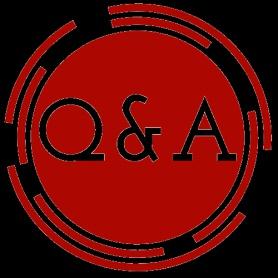
True This is what I call the deterrent strategy Many girls are told that they can do whatever they want only a er marriage The first thing for us is to make sure our dreams are bigger than our fears Look at what will be the impact if you pursue your passion. What are all the good things that you can do, if you pursue your passion? Imagine and visualize the kind of world and life you will be living if you
Power does have nega ve connota ons. And especially for a woman, we say that power goes to her hair You have to redefine power. It is the ability to be who you are and do what you want, of course, adding value and living your purpose That is the balance that our power should bring. In fact, I would say that with power comes greater responsibility and with greater power comes greater responsibility
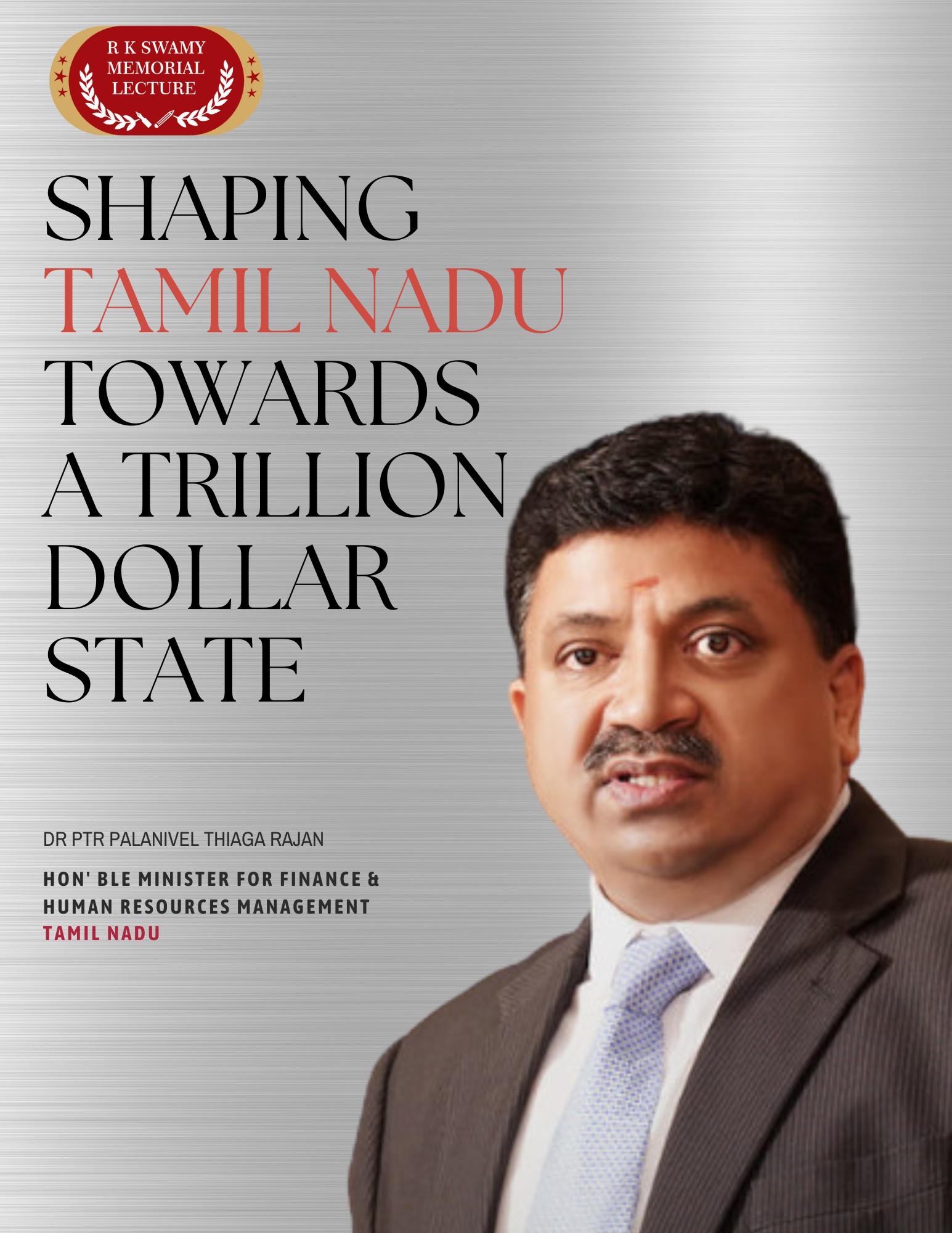
Dr Palanivel Thiaga Rajan, the Hon' ble Finance Minister of Tamil Nadu, outlined his views and perspectives in his address at the Fourth R K Swamy Memorial Lecture.
Many states have announced their trillion dollar goals, including the state of Uttar Pradesh. Of course, the first difference between us is that by population and size, Uttar Pradesh is about three times that of Tamil Nadu So even when UP gets to a trillion dollars in roughly the same time as us, it would still be at a per capita level one-third at best. Whereas, in Tamil Nadu, we are already effectively a ‘below-replacement’ rate society But, slogans and targets are important in the political discourse. They are important in setting a common agenda for everybody to work towards For Tamil Nadu, I want to discuss about how we to the trillion dollar goal with three different perspectives: one, purely a mathematical or macroeconomic perspective; two, an administrative or a top down perspective; and three, a people-based, bottom-up perspective
The problem with targets is that there are two or three major variables beyond our control The first is
population. Economy has a very different feel, depending on the size of the population and the rate at which it’s growing The second is that we don't control the value of the dollar. And finally, the targets are set in nominal terms or that day's money. When you set it in nominal terms, you have a variable of inflation or the weakening of money, which is also not in your control.
If we assume that we're starting roughly at around 300,000 and we have to get to a trillion dollar, assuming that there is not any dramatic movement in the exchange rate, then mathematically, we're looking at a compounded annual growth rate (CAGR) of about 14 to 15% a year, between now and the year 2030 That seems like a lot. But it is neither that big a stretch nor historically unprecedented. For example, in the years 2006 to 2011, we achieved about 10 15% real growth without the effects of inflation If we assume inflation was 5 to 6%, we were averaging 15 to 16% growth. The odds are that inflation stays closer to 6% for the foreseeable future for various reasons around the
world So it's eminently doable in terms of just the mathematical requirement.
We have some very good tailwinds and a couple of looming threats. From the tailwinds perspective, the diversification and logistical delinking from China and the increase in the scale and scope of the Indian economy, all benefit Tamil Nadu disproportionately We are one of the preferred destinations of the global de-risking and decentralization. As has been the case since 1991, the year of the reforms, we generally have a levered rate relative to the Indian average. If the Indian economy grows at 6 or 7%, we tend to grow at 8 to 10% That's because we have relatively good infrastructure, a very well educated, large and young workforce and better connectivity than most people in terms of ports, airports, internal transportation, etc. These are some of the good tailwinds We have seen 40 to 50% increase in global investments since last year We're continuously fielding new inquiries and trying to

close new transactions In many ways, we will benefit from that. This morning, I had the Vice President of Uber Global from the Bay Area here, talking about how they could help with public transportation models and new approaches.
The one real fear I have which is not unique to us, is that we are in an unprecedented situation in terms of global liquidity and global fiscal constraints If you look at global monetary policy since 2008, there has been unprecedented excess liquidity probably to the order of 4 or 5 trillion pre-Covid and then another 2 or 3 trillion since then sloshing around in the system
Very few countries like Singapore are desperately issuing new securities and soaking up the excess liquidity in the market
After the pandemic, most governments did a lot of fiscal stimulus. As long as was only monetary stimulus, inflation was contained, as the money was not actually reaching the hands of the people who could spend it But fiscal stimulus by design gets it into the hands of
every citizen or the lowest part of the economic structure They spend it and then they invest it like low level stock investing as opposed to the big conglomerates that get access to the liquidity and buy real estate, market assets, etc
I've never seen this rapid rate increase in the 20 years I lived in the US. Of course, it started from unprecedentedly low levels. I've never seen this kind of a rapid rate increase by the Federal Reserve of the United States and many other banks are keeping up with it. So there is a reasonable risk of a global recession and the central banks of the world cannot engineer a soft landing through an unprecedented storm of liquidity and inflation
As government, our job first is to manage the fiscals of the state properly It is an undeniable truth that states that borrow for capital investment and states that control their interest payments as a percentage of their total revenue spending, tend to have better growth, going forward. That is a truism. I quoted it right out of the RBI book at my maiden speech in the Tamil Nadu Assembly in July 2016 It's as true now as it was then
So from that perspective, our first job as government is to bring the fiscal under control and meet those two criteria that we borrow only for the sake of investment and that we control the interest cost as a percentage of the revenue. Now, both these deteriorated dramatically between 2014 and now.
From 2003, the passage of the FRBM act in Delhi and the FRA act in Tamil Nadu, till 2014, across all parties, the fiscal of the state kept improving. Debt-toGDP came down from 28% to 16 or 17%. Interest revenue came down from 21-22% to 10 to 11%, till there
was a serious political leadership vacuum. Our view may have been different than that of Ms Jayalalitha of ADMK But as long as there was some leadership executing some view, the fiscal was in control. After her incarceration in 2014, things turned dramatically worse And for eight years in a row, we had record revenue deficits, culminating in a revenue deficit of about 62,000 crores in 2021.
We have started to make a big dent in that in 2122, though coming to office after 10 years and spending about 20,000 crores more than what was planned in that February in the interim budget and losing about 8000 - 9000 crores in revenue due to multiple lockdowns for second and third waves We reduced the revenue deficit and the fiscal deficit by 16,000 crores last year, the first turnaround in eight years. And we are on track this year to do something similar. So when we borrow less for revenue expenses, we are able to invest more.
We have a debt ceiling, both in terms of the FRA act and more stringently by the one imposed by the union government on all states using their Article 293(3), the equivalent of first lien rights where they limit our borrowing. So, the less we borrow for revenue spending, the lower we pay in interest later The more we invest this year, the more capacity we build as buffer for the future. Under the terms of the 15th
So from that perspective, our first job as government is to bring the fiscal under control and meet those two criteria that we borrow only for the sake of investment and that we control the interest cost as a percentage of the revenue.
Finance Commission, if we do not use the allowed borrowing limits, we are able to roll them over till the period of expiry of the 15th Finance Commission, which is 2026, after the one year extension that the Prime Minister gave them due to COVID. So, we are doing that part properly
The second part is to improve the ease of doing business Because the government can only do so much, what we really need is private investors, private entrepreneurs and independent businesses, particularly the MSME sector, which creates about 70 to 80% of all jobs, to step up We need to make it easier for them to do what they do, which is to take risk, build rewards for themselves, create employment for people and improve the overall economy of the state.
We are doing quite a lot We are now actively engaged with the state-level bankers’ committee, ensuring access of credit and distribution of client base, to reach as many entrepreneurs as possible, partly through improving communication and training through the MSME department whose Secretary happens to have double hat as the expenditure
secretary in my department So we work closely together There's a lot more we can do Guidance Tamil Nadu, which is a single window promotion agency, almost routinely wins Best Agency of the Year awards. We are generally reducing the red tape
I'm also starting to have discussions with my counterparts in Andhra, Telangana and Kerala, particularly with Telangana, which is the most direct competitor to us I've had a couple of conversations with my friend KTR to make sure that we don't get cannibalized into transactions that are disruptive or destructive of value But that's something that's on the fringe
The biggest constraint for the government of Tamil Nadu is not money but the capacity to execute on time, under budget, and deliver finished outcomes as planned. That's not new or unique to the government of Tamil Nadu and that's all over the place But in Tamil Nadu, we have a problem because our capital expenditure ratio went down from almost 3% of GSDP in 2011 to about 1 to 1.5% at the bottom, in 2021. Now, when you reduce your spending that much relative to the scale of the economy, clearly, the capacity of execution does not sit around idle waiting for you to spend that kind of money So some people go out of business, some machines get moved, some companies diversify, some relocate. And so overall, our ability to execute as quickly as we can provide the funds is in fact a bit constrained And that's partly a legacy problem After seven, eight years of falling investment, it's not likely that you can just turn that switch on overnight. So it will take us a while. Particularly, we're very focused, therefore, on more and more PPP model, rather than the Government of India's model where you build something first, and then try to monetize it later.
The biggest constraint for the government of Tamil Nadu is not money but the capacity to execute on time, under budget, and deliver finished outcomes as planned.
We believe that doing it as PPP not for core things like citizen services like drinking water but for construction, for infrastructure, for ports, airports, roads, and so forth.
Ms Jayalalitha too had a model under her Vision 2023, though it never got executed The vision was to double capital expenditures from 3% to 6%. By having the 3% borrowing plus 1.5% surplus in revenue plus 1 5% of private investment, either through funds or directly into projects or in partnership with the government in some other PPP way, we can get to 6%.
But certainly our ambition is to get to 3% and to find another 1% or 1 5% in PPP The greater value of a PPP model is not just that we leverage capital but they will bring the execution skills, the EPC capacity, the engineering talent, the ability to deliver on time under market discipline of the capital they have raised and their need to answer to So top-down, this is the way we see it. We need to ramp up annual capex back to 3% of GSDP.
We've just put that in a quantitative model this year Nominal GDP is estimated about 24 5 lakh crores If we continue down this path, we will be at 30 lakh crores or so in two years. So, 3% of 30 lakh crores will be about 90,000 crores If we have reduced or eliminated the revenue deficit by then, which is the track we are on, barring a global recession, we will end up tripling our capex in two or three years As long as we can find the execution capability to do that much capex in time, then, we will suddenly see a huge multiplier effect and not have a problem in reaching our 15-16% CAGR in nominal terms
But there's a third component or a third perspective to this Just because I have the money or engineering
The higher we have per capita productivity, the more globally viable and competitive we are and the better the quality of life that we can deliver to our citizens,
capability or a company with the administrative bandwidth or systems, it does not guarantee outcomes At the end of the day, it is the people that are the most important asset or limitation of any society, community or state And since we are in a global economy, whether we like it or not, the final deciding variable is per capita productivity. The higher we have per capita productivity, the more globally viable and competitive we are and the better the quality of life that we can deliver to our citizens, if we do everything else right.
And in particular, I would focus first on the notion of inclusion. Different people have different philosophies The Economist recently carried an article and was called the Gujaratification of India. It basically showed how the investment ratios have changed how much towards capex, towards social spending, and so forth They compared Gujarat and Tamil Nadu and said the two of us have roughly the same per capita income. But the poverty rate in Gujarat is four times the poverty rate in Tamil Nadu We are fundamentally different societies in terms of the distribution of wealth, consumption, education and access. This is a very important distinction. When you build refineries and robot driven manufacturing plants, you're going to pick
if we do everything else right.
only the cream of the crop. But if you want to build a wide-based average productivity model, where many people get better off and not a few, then you have to increase per capita productivity and increase inclusion in the quantifiable economy
So from that perspective, I would say the more we invest in children, the better. For example, in the remedial education program, Tamil Nadu is a pioneer Our Illam Thedi Kalvi scheme has now been presented at the UN General Assembly. For 2% increase in spending, we have achieved a 17% improvement in the remedial upside of children coming back to school We have started under the chief minister's leadership, a pilot program to provide free breakfast to young children Most mothers are not able to get up, cook and supply food to their children before they go to work or before the children go to school, which is often very early – 7or 8 o'clock in the morning.
The other huge variable, I think, is to truly be inclusive of women in every aspect of the economy We take some pride in Tamil Nadu, in that, with the Justice Party government at the helm, starting in 1921, women
were given the right to vote and stand for office We had women legislators We had a woman deputy speaker or leader of the Madras Legislative Council. Compulsory elementary education when legislated in 1921, covered both boys and girls
We have almost 85% of all our 18 year old girls either graduated from high school or gone through high school. That's not so in most other places. In Gujarat, it's 50% But that is only a beginning That is nowhere near enough Every time I go to a school or a college, especially women school and women colleges, I exhort them to continue. Having gotten good education, having come this far, having more girls as rankers in the exams too few of them get to operate in the quantifiable GDP calculable economy. Many of them get married or for other reasons, they don't participate.
So the government is focused on increasing their activity in multiple ways, starting with something as simple as providing free bus transportation, so they're not dependent on anybody and can actually find their way to work, even if it is a domestic work or anything above that. The free bus rides enable them, empower them and free them up from constraints. We focus on a lot of other ways to bring more women into the workforce
We found Tamil Nadu has the highest gross enrolment ratio into tertiary education at 52%, almost double the national average and 15 points higher than the second state which is Kerala But there is a dismally low college enrolment rate for girls coming out of government sponsored or government run schools. So, we have now put out a new scheme where any girl who comes out of a government school and joins ITI or a polytechnic will get 1000 rupee a month scholarship. And anyone who comes out at 12th class and joins a regular college will get 1000 rupee scholarship
We are working closely with many different models, including with multiple organizations from Germany, where they have a skilled apprenticeship model of very highly paid skilled trades...
In Tamil Nadu, like most places in India, we have a surplus of college educated graduates who are looking for work on the one hand, and many companies who say that they don't have enough employment-ready or skilled-ready workers to recruit, on the other hand. When you expand the scale of education, this is only to be expected Partly to fix those problems and partly to give proper career guidance and counselling to current high school students and their parents, our CM Mr Stalin has inaugurated his pet scheme, called ‘Naan Mudhalvan ’ It provides the kind of skill and work ethics to increase the employability of the workforce. This is for both existing young people who don't have jobs, as well as future generations that will come out of school
We are working closely with many different models, including with multiple organizations from Germany, where they have a skilled apprenticeship model of very highly paid skilled trades, particularly in the automotive and robotics and other sectors. I learn that IBM is working closely with us and creating a lot of certified programmers for particular kinds of needs So I would say in conclusion, that, barring a global recession, we will get to our goal in time. On the other hand, if we were to see a global slowdown, Tamil Nadu is better hedged than most others Above all, I was a risk manager in my career in the financial service industry I've applied my own way of thinking and will ensure that we're properly hedged as best as we can be. A recession doesn't mean that money disappears It just means that growth slows down or goes negative. That's when governments really need to step up spending and support the bottom of the pyramid and stimulate demand
In the final analysis, there are probably three important things that I can see if we have to achieve
relatively above average outcomes The first is, we should have compassion To me, the overarching quality of a public servant, of a government, of a party is humanity. We are here for improving the lives of people, starting with those that are the worst of the least and provide them with opportunity Not that everybody stays at the same place all the time. Some people improve, some fall behind, some get hurt, some lose their jobs. So we ought to have a system that is flexible and dynamic enough and we should be able to find those in need today. There is no such thing as permanently in need and permanently not in need. So we need to think more dynamically about that
The second quality, I would say is competence Everybody talks big The question is: Can you deliver what you say you will deliver? I think very few people focus on that and very few people actually deliver that. I'm very proud to say that my chief minister every day holds us to that standard. To do all of this, you really need political courage, because without reform, there is no improvement You can't keep doing the same things and expect that suddenly the world will give you better results. You got to do things differently and better. And in politics, reform is a very dangerous word.
Many of you may have seen the comedy series called ‘Yes Minister’ and ‘Yes Prime Minister.’ The civil servant, Sir Humphrey who wants to put a noose around his minister’s neck, waits till the minister makes a proposal and he says, “Yes, yes, that's all good. Very good. That's great.” And then he says, “But Minister, that's a very courageous decision ” That's the anathema in politics Not many people can make courageous decisions. I've been very fortunate to have a chief minister, who, himself makes courageous decisions and most importantly, backs me limitlessly when I have to make courageous decisions.
f o u n t a i n h e a d o f e x c e l l e n c
The Elec on Commission was formed a day prior to India becoming a republic, to convey the message that it is an independent body. In the first elec on that was held in 1951‐52, there were only 17 32 crore electors There were 403 cons tuencies. Contrast this to 2019 elec ons when we had 543 cons tuencies; 91 19 crores of voters and 10 lakh and 10 thousand booths, said Dr Gopalaswami. According to him, the makers of the Cons tu on deserve applause for believing in universal adult franchise, even though 15% literacy rate was found in men and only 7% in women However, when it came to vo ng, women par cipa on was very low to start with. In the 51‐52 elec on, it was only 1 15% But in 2019, women have overtaken men by 0 17% Tracing the evolu on of elec on commission over the years, he touched upon the crucial role played by former CEC Mr T N Seshan in making the elec on commission an independent and powerful body, enforcing the model code of conduct, introduc on of voter ID cards, etc He also traced the evolu on of EVMs. In 1982, the then EC started using the EVM but in 1984, its use was stayed by the SC and ballot
paper was restored. It took another 8 to 9 years before the cons tu onal amendments were made and EVMs were re‐introduced. EVM has gone through various itera ons. The latest machines allow a maximum of 384 candidates to fight an elec on in a cons tuency. TN was the first state to use EVM for an en re state elec on, followed by Punjab In the 2004 Parliamentary elec on, the en re country went with EVMs. Integrity of the machines has been verified through VVPAT, he said
Dr Gopalaswami highlighted that there are many reforms that need implementa on and listed some of them: giving rule making power to EC, proxy vo ng for overseas Indians, need to relook at electoral bonds, power to de‐register poli cal par es, preven ng people with serious criminal records from contes ng and so on On one na on, one poll, he said that it is technically possible but poli cally, it may be difficult As a pre‐requisite for this, Ar cle 365 should be done away with. Regre ng that electoral par cipa on in ci es is very low, he paid tributes to India’s first voter Shyam Saran Negi from Himachal Pradesh, who died at 105 years recently, having voted in 17 parliamentary elec ons and upholding the spirit of democracy
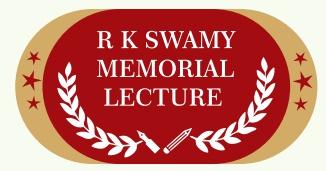


MMA‐KAS presented an online fireside chat on the theme of the book, “Afterness –From Home and Away” authored by Dr Ashok Ganguly, Former Chairman, Hindustan Unilever. Mr R Gopalakrishnan, Former Executive Director, TATA Sons Ltd , led the chat Mr V Balaraman, Past President, MMA and Former MD, Pond’s India Ltd chaired the session
Mr V Balaraman: Dr Ashok Ganguly was not only my superior but also a guru in many ways He was born in the year 1935. He got his Ph.D. from the University of Illinois, worked for about 35 years with Hindustan Lever and for ten of them between 1980 and 1990, as the chairman of the company. After that for seven years, he was on the board of Unilever Dr Ganguly has been nonexecutive chairman of ICI, First Solutions, Anand Bazar Patrika and an independent director of ICICI Bank, Mahindra and Mahindra and Dr Reddy’s Laboratory. He also served as an external director of RBI. He has been very widely recognized He is a Padma Vibhushan and has been on the Prime Minister's Technology Advisory Committee for several times.
Mr R Gopalakrishnan: Dr Ganguly was initially a senior officer in the company. Then he became my boss and then my mentor Naturally, for the past ten years, he is my friend. As I read his book, the principle of obliquity struck me In life, things come to you when you don't aim for it The happiest people are not chasing happiness. The most profitable companies are not chasing profit The most successful tennis players are not chasing victory. They want to win, of course, but their focus is not just on playing well but enjoying themselves
Dr Ganguly is a walking exemplar of obliquity, because he never thought he would go to the US and get a PhD He came back because he wanted to look after his parents in Bombay. He never
intended to join a multinational company He joined the MNC and became its chairman. He was invited to join the cabinet by Rajiv Gandhi, formally or informally but he turned it down saying, “I'm not good at politics ” He never intended to write this book but he has written the book. So my first question to Dr Ganguly: Is your life a series of apparent accidents or coincidences?
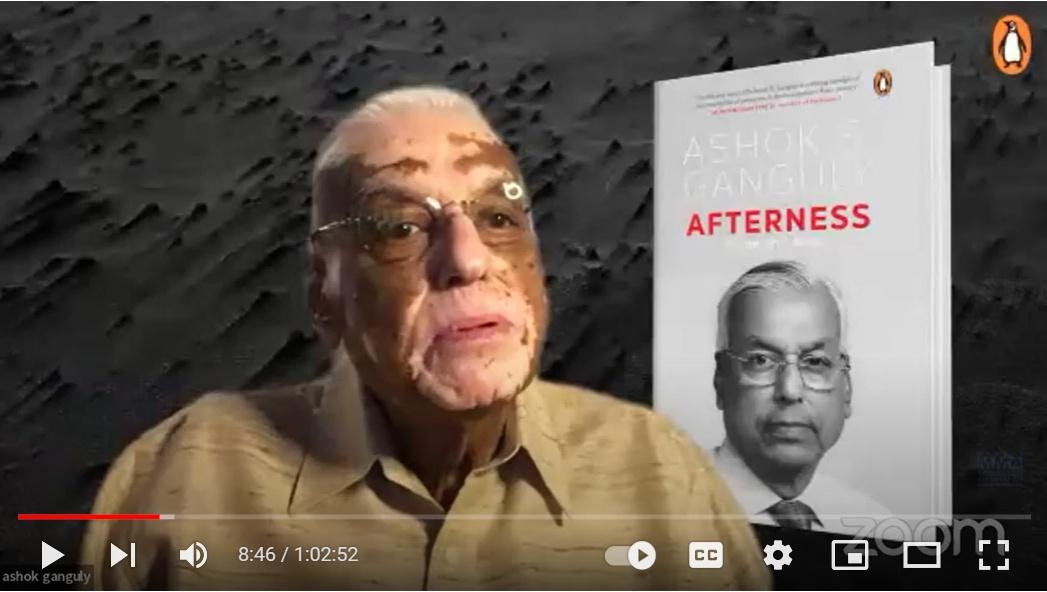
Dr Ganguly: If you're anxious about things in life, there's a statistical probability of those things not happening exactly as you wanted them to happen Looking back on my life, when I ask, “Is it what I wanted to do?” there is no answer to that question. But I am pleased with the way it all went. I was not a very popular public speaker I did not have a formula or a map to
Don't plan your success. Develop the people and the talents, who are your colleagues and working with you. Devote yourselves to their future, rather than be preoccupied with your own future.
succeed in life. I tried to tell people, “Don't plan your success Develop the people and the talents, who are your colleagues and working with you. Devote yourselves to their future, rather than be preoccupied with your own future ”
Mr Gopalakrishnan: Our own scriptures say that you do your duty and let the results come Many people think of Dr Ganguly, the chairman as a toughie who was driving for goals. He was fair to everybody by the way but very demanding After 25-30 years, you seem like a mellowed human being. Is it true that you have changed?
Dr Ganguly: I got a job to do. I had very brilliant and outstanding predecessors. I did not want to copy any of them. My job, as head of the company, demanded of me to be a tough person I did not play act my role
I did not go out of my way to invite people to see the inner Ganguly. I was quite happy to be perceived as I was
Mr Gopalakrishnan: How does Hindustan Lever manage to produce such an inventory of good people managers, who then go to other companies and lead them very successfully? What is the secret sauce?
Dr Ganguly: It is their uncompromising commitment to meritocracy Nothing else counted I don't think there was anything exceptional in me. I'm also modest
enough to say that there might must have been a pool of people from whom they selected me.
Mr Gopalakrishnan: Are you saying that in Hindustan Lever, the people are not individually extraordinary They are ordinary people but together they bring extraordinary results. Is that a fair summary?
Dr Ganguly: Yes That's a great summary.
Mr Gopalakrishnan: What causes the feeling in business leaders that they are indispensable? Is it self-obsession or something else?
Dr Ganguly: I guess there is a combination between immortality and indispensability You can you can start believing in the swan songs of your colleagues who say, “What can we do without you?” I would guide them immediately to the backyard of the church where many gentlemen are resting in peace People who think that he or she is indispensable has a deep insecurity within themselves.
Mr Gopalakrishnan: I met a naval officer once who described to me the wake of a ship and said, “If you really want to understand if the ship has good stability in flowing through the waters, you don't look at the front of the ship or the master of the ship Look at how it leaves ripples of water on the sea, after the ship has gone. If it is
People who think that he or she is indispensable has a deep insecurity within themselves.
~ Dr Ganguly
symmetric and harmonic (wake in naval terminology), then it's a good ship ” He went on to add that in the world of management, it is not what a particular CEO achieves but what people say about him after he has gone.
Dr Ganguly: True. Well, the captain of the ship can make mistakes. One has to modestly accept that there is no such thing as a perfect leader and an immaculate succession planning. We are human beings If we said that we did not make mistakes, either in the choice of people or strategy, it would only give a wrong impression.
Mr Gopalakrishnan: You were a member of former Prime Minister Rajiv Gandhi's Scientific Advisory Council (CSIR) along with CN Rao and others. What can we learn from the behaviour of Rajiv Gandhi, a non-scientist, as Chairman of that scientific forum?
Dr Ganguly: Rajiv Gandhi had come with one of the largest majorities in parliament in the history of India The greatest quality he had was that he never pretended to be what he was not. He had great patience and commitment to listen and hear to everyone. He had developed a vision on what we should be and how we shouldn't be, although he was led down quite badly by the officials at that time. In our meetings, if he did not understand, he would raise his hand and say, “I don't understand this Please explain it to me ”
In many homes, the pressure is on children to achieve more than the parents. I was a complete failure in school. My father was a man of gravitas and great capability. But not for one moment, through all my years in school, did he ever display, directly or even remotely, any sense of disappointment.
~ Dr GangulyMr Gopalakrishnan: What about the role played in your life by family and your gracious wife?
Dr Ganguly: My marriage was an arranged marriage in the Indian sense
It turned out to be a life of love and affection. My family deserves 80% credit for whatever I achieved. The importance of family in making you what you are, has not been discussed much in the public domain as much as it should be. It's enormous. In many homes, the pressure is on children to achieve more than the parents. I was a complete failure in school. My father was a man of gravitas and great capability But not for one moment, through all my years in school, did he ever display, directly or even remotely, any sense of disappointment So life started with happy-go-lucky childhood, being into a family that was full of great love and affection. There was a comfort factor, which was responsible for what I became.
Do you regret not joining the cabinet of the Rajiv Gandhi government?
Dr Ganguly: No I knew my strengths and weaknesses I would have been a complete failure in poli cs
How can young managers plan their strategy for success in the corporate world based on your experience in the corporate world?
Mr Gopalakrishnan: During the first 10 or 15 years of our career, we set targets just like we do for produc on or sales or costs But a er that phase, we realize that management career in fact, life itself is not like a law of physics that focusses on the cause and effect It follows the lawlessness of biology, if I may venture to put it that way The lawlessness of biology is that biology evolves. Various factors come into play Si ng and doing physics planning can become a bit of a waste of me So be aware that at some phase, there's a transi on that happens, from physics to biology

We live in unusual times with founders removing the CEO and sometimes, CEOs removing the founders. How can corporate leaders navigate this complex world, keeping in mind what's happening around you?
Dr Ganguly: To get talent, you have to be pa ent with talent and go with the talent Business owners have the privilege of hiring and firing Professional companies and business owners always want something more There's impa ence If the shareholders are not happy, they have a right to hire and fire Depending on what
line you choose, you also become a part of that culture
Mr V Balaraman: If the ques on is referring to the billionaire businessman (Elon Musk) and the recent controversies, then globally speaking, he is destroying value. If you cannot appreciate value, you will destroy value He's got so much money and he can afford to do all that You must be a great human being like Dr Ganguly
What I have learned, a er many years in both personal and business life is that one has to be human
Don’t just es mate a person based on what he or she has done in the past There is a giant inside every human being. What brings the giant out is great leadership, someone who values and expects the world out of the individual I have known very good leaders, who by sheer expecta ons, have brought out the very best in people. If people know that they are trusted and backed, the best in that person comes out. That is leadership.
What are your views on current trends like mass resignation and moonlighting?
Dr Ganguly: I'm very old fashioned You cannot have moonligh ng. It is le ng down a company like le ng down your family.
Companies are focusing more on the bottom line and ignore the consumer needs. Do you think that the bottom line is more important than the consumer needs?
Dr Ganguly: Consumer needs always come
first. Meet that and you can even forget about the bo om line
Why should the corporate world encourage innovation and a sort of start-up culture in their own organisations?
Dr Ganguly: Either innova on and change is in your gene or it is not. If you're not con nuously changing and innova ng, you're really cu ng down longevity. Even in trade, you need innova on I do not have any ac vity where I don't have to innovate in order to survive and thrive It’s as simple as that
What are your views on work-life balance?
Dr Ganguly: I think it's a corporate’s responsibility to provide you with health support. In our days, we had very modest salaries So the health support to aging parents was a great burden on our mind. Emo onal balance is mostly derived out of your family to the extent of 80%. I didn't realize when I was working, that my family was providing me the emo onal quo ent, which made me behave as a person I did What should young leaders focus on?
Dr Ganguly: Focus on your work Be outstanding Excel in it Don't be overly anxious, drawing the graphs of who is ge ng what Remember somebody else is taking care of you on the job. Bring out the best in you, rather than worrying where you will be in 3 years’ me and ten years’ me Plunge yourself in your work and give your best.

MMA organised a discussion on the theme of the book, The Man Who Would Not Be King, authored by Mr P S Raman, senior advocate and former advocate general. The author led the conversation with Mr Sriram Panchu, senior advocate, Madras High Court; Mr Ramesh Krishnan, former tennis player and Arjuna Awardee; and Mr Mohan Raman, actor and film historian
The kingdom was offered to him on a platter.
Mr P S Raman
Senior advocate and former advocate general
My father V P Raman was truly a multi-faceted personality What do you say about a man who joined school and by the time he was in his fourth or fifth standard, was already talking about Plato, Aristotle and Socrates and not Enid Blyton and the Malory Towers? When he was in the seventh, he was learning violin from Papa Venkatramiah and became an accomplished violinist. By the time he had come to the tenth standard, he had two double promotions in Church Park Convent
So he was underage to write the Senior Cambridge examination. What did he do? We would have normally sat at home and waited for a year or two to pass But his higher achieving father my grandfather made him learn shorthand and typing in six months’ time and at the end of that six months, made him become
the private secretary to the late TT Krishnamachari (TTK) He made him work as his PA for one full year before he had the time to start writing his Senior Cambridge and become a member of the Loyola College.
He then got into Law College and in two years broke all the records He joined the DMK party, becoming its first and the only forward community member of the DMK's executive committee, becoming its Constitution drafting committee's convener Later, he quit DMK He had a hyperactive social presence in Chennai and beyond. Then he said goodbye to everybody. All these were packed in just 59 years.
What started off as a book of anecdotes turned into something more, because of the discovery of various records which my grandfather and father had maintained inside a forgotten safe deposit locker behind a painting in my house It was almost cinematic I opened it one morning and there I found some 20 to 25 files, ranging back from 1920 and going up to
almost the time of his death. I was amazed by the record-keeping ability of my father and my grandfather I could spot the conduct certificate given to him in 1945 by TTK and his mark sheets in Church Park Convent.
'The Man Who Would Be King' is a beautifully written a novel by Rudyard Kipling He wrote it in 1888 It's about the life of two adventurers who travel to a fictional place in the northwest of India, the then British Raj The book got immortalised 150 years later by John Huston. He made it into a movie in 1975 with Sean Connery, Michael Caine and Christopher Plummer acting in it Coincidentally, Sean Connery and Christopher Plummer died during Covid, as I was writing the book.
I tweaked the title a little by saying 'The Man Who Would Not Be King,' because in Kipling’s book, the lead character desperately wanted to be a king When he had it, he lost it. But the protagonist of my book, VP Raman, whenever the kingdom was offered to him on
a platter, declined it for some reason or the other. There were particularly four crucial moments in his life when he declined
First was his resignation from the DMK in 1960 from a position of high eminence Had he swallowed his pride and stood there at that time, when the DMK came back to power in 1989, he would have been the second senior-most in the government, as he was even senior to Anbazhagan. That is one kingdom which he lost. Thereafter in 1963, when he had gone for his first appearance in the Supreme Court, then Chief Justice Gajendragadkar was so impressed with him He called him to his chamber and asked my dad to become a judge. He said, “No. I'm only eight years in the bar." The Chief Justice said, "I will make you a judge in two years’ time as I will be around for nearly four years " If he had accepted it at the age of 32, he would have become a judge of the High Court. Possibly, if he had continued and with this brilliance, he would have made

a great judge But temperamentally, I think, he chose the right decision He would have possibly become the Chief Justice of India and been there for 10 or 15 years. It was the second time he refused the kingdom.
The third time, it was in 1977, after emergency was lifted in India and Shah Commission was appointed Mrs Indira Gandhi wanted him as his lawyer. He was already her lawyer as Additional Solicitor General. Mrs Gandhi wanted him to defend her and her son Sanjay Gandhi in the commission. My dad for some reason said, "I will defend you, Ma'am, but I won't defend your son " She said, "No, Raman We are very keen that the same defence should be there for both of us We don't want separate counsel." He said, "In that case, I'm out of the case, " and he left it. Had he stood with them through that commission, which was anyway a commission which didn't result in anything significant, much like most other commissions, he would have been possibly the Attorney General of India when Mrs Gandhi came back to power in 1979
The last time was in 1984 when he got his revival into his legal career. Everything was going great. I had travelled with him to many places. Very suddenly, he lost the zest for the profession At that time, if he had gone back to Delhi and set up a practice, he would have become one of the big time senior advocates of the genre of Parasaran, KK Venugopal and Soli Sorabjee They were all in the same vintage, three years up or down. So the fourth time, the kingdom was thrown. When somebody does that four times in the life, I think he definitely deserves to be called 'A man who would not be king '
In 1963, when my dad was hardly 31 years old, he made his first appearance in the Supreme Court as a lawyer taking up a Special Leave Petition He was standing before five Supreme Court judges and even
before he could say a word, all the five judges started bursting questions to him, one after the other, without waiting for him to reply and when they finished, he quietly turned to the Chief Justice Gajendragadkar and asked, "My Lord, the Chief Justice Excuse me This is my first appearance in the Apex Court So I do not know your protocols. Do I answer your Lordships’ questions in the order in which they were posed to me or based on the seniority of your Lordships or based on my perception of their relevance to the case?
Justice Gajendragadkar looked at his side and all the judges started laughing. He said, "Issue notice." Justice MC Chagla was sitting next to dad He caught dad's hand and said, "Well done, young man You had a very tough case for admission. You won them over with your wit and repartee. Never lose the two."
In court, VP Raman wielded the assassin’s knife.
Mr
Sriram Panchu Senior advocate, Madras High CourtIshared a relationship with VPR (VP Raman), which wasn't the best to begin with, because I was a fervent anti-emergency man as a young lawyer. Our first few encounters were not exactly of the pleasant kind. Things warmed up as I started to engage him in professional matters. And then, I marvelled at the razor sharpness of the man's mind his sharpness in understanding a case and delivering it in court I had never seen anything like it.
In his last few years, VPR took the privilege of asking me to be the executor of his will One thing about having an executor is that you have the right to change your will at any point of time. Handling VPR's will meant going to Lloyd's Road every week. We both
f o u n t a i n h e a d o f e x c e l l e n c e
would sit and have long conversations He would share anecdotes, his reminiscences and the wisdom that flowed from him.
But on my part, I troubled him and said, "You cannot quit How can you stop?" I cajoled, begged, pleaded, remonstrated and threatened I did all kinds of things. I said, "Just come back to it. Practice in Chennai if you want. Or let's go to Delhi. You will be the king of the SLP (Special Leave Petition) Court ” In the Supreme Court, you can file Special Leave Petitions and the judges do not give lawyers more than 30 seconds to make their point I knew that VPR could have taken apart a 300-page High Court judgement in 15 seconds. He didn't need 30. He would have been the king. I consider it as one of my greatest failures that I could not succeed to get VPR back in his legal profession
But I understood that he was a man who had conquered his own Everest. Lesser peaks and minor plateaus were of no charm to him In the heavenly firmament, we have stars But we also have comets and meteors and they blaze across the sky. They blaze when they are young. Perhaps it is in the character of a comet or meteor that it must run its course before other twinkling stars run their course. I simulated that. But he was a wonderful man to get to know and to spend time with There are so many facets to his life He had a great style of advocacy and held to his principles
In court, VP Raman wielded the assassin’s knife. He had the art of going for the jugular in a matter of minutes and a few crisp sentences The judge would have no way but to give it to his way When he argued, there would be no blood all over the place but it was the lawyer on the other side who knew that death was in the air He also had a gift of combining humour in his arguments He used humour, wit, quotations and
drew on his extensive engagement with literature That made him a very fine lawyer and not just his knowledge of the statutes. One of Rudyard Kipling's quote says, 'Do not over pride yourself in money, position and glory because one day you will meet the man who cares for none of these and that day, you will know how poor you are.' VPR is one of that fast vanishing breed. He had the courage of speaking truth to the power
He always called a spade a spade, sometime a club.
Mr Mohan Raman Actor and film historianMy father was a great lover of sports He had many friends in the film industry. Lyricist Kannadasan was one of his closest friends in the film industry One day, he walked into our house and told my father, "Just now I wrote a song about your family, for the film 'Lakshmi Kalyanam.' My family has many Ramans My father was V Pattabhiraman My elder brother is P Sundaraman My youngest brother is P Raghuram. The Tamil song that Kannadasan wrote is, 'Raman. Ethanai Raman adi?' (Raman. How many Ramans there are!) The song lists many names of Rama As we had many Ramans in the family, there would be constant confusion. Whenever my father picked the bakelite phone, somebody would ask for a Raman and my dad would ask, "Which Raman do want to speak to?"
I have a feeling that my brother (PS Raman @ Bharath) with his knowledge of law, his association with politics, following my father in his footsteps and being the Attorney General of Tamilnadu, has a better perspective of my dad's life than me.
f o u n t a i n h e a d o f e x c e l l e n c
I would like to add one more point where my father refused to be king Between 1977 and 1979, my father was Tamilnadu's Advocate General when MGR was the Chief Minister Then suddenly, due to some misunderstanding created by somebody, MGR kept my dad a little away All he had to do was to seek 15 minutes time with MGR, sit down and say what happened and clarify things over a cup of coffee or Horlicks (MGR did not take coffee He would have Horlicks or milk) We all persuaded him from the family But he did not listen and simply said, "I know MGR from 1952 and he knows me so well There is no meaning if he expects me to go and sit with him and clarify "
He always called a spade a spade, sometime a club I will never say he was a benevolent king to all because he was benevolent to the person for whom he won the case but not for the other guy Everything was black and white to him There was nothing called grey He could be charming with someone and at the same time, be so brutally honest with his feelings, emotions and views with another person That was his problem
Ramesh Krishnan who is my brother Bharath's close friend from childhood, had been the apple of the eye for my dad because of Ramesh’s extraordinary success even as a school child, in the world of sport He was a Junior Wimbledon champion Dad would tell me, "Either you have to shine in studies like me or be good in sports like Ramesh Krishnan "
As Bharath said, my dad had a meticulous way of keeping records It is very sad that most of us are poor in keeping our records The film industry is paying for this lapse They are unable to locate the original prints (or negatives) of the films made in 70s and 80s This is
true even for Mani Ratnam's movie Nayagan Luckily, they had the Telugu version What we have in Tamil today is based on this Telugu version mixed with sound track from the Tamil version The national film archives is doing its best but I don't think they are succeeding pretty well My advice to you all is to keep all the photographs -of your granddad or great granddad and others safely Someday, it will be a treasure for your grandchildren Who knows? You might also get to write a book and they will all come handy
By the time I got back, it was early 90s and VPR had passed away.
Mr Ramesh KrishnanFormer tennis player and Arjuna Awardee
Ihave a feeling that we have not heard the last of this book and that it could well be made into a movie That is Mohan's forte! My connection here is with Bharath (PS Raman) From toddlers, we've been at school together and we spent 14 or 15 years in school. We got to know each other very well. I regret to say that I did not know his dad VPR very well We were in school till 1977 after which I started getting into my tennis. I was away from their family for 14 years, perhaps since we are in the subject of Raman and Ramayana! By the time I got back, it was early 90s and VPR had passed away. Of course, I reconnected with their family and we were able to pick up the threads from where we had left Bharath and I, both represented our school in sports. I remember fondly the trip we made to Yercaud. Bharath represented the school in Table Tennis and I played in Tennis We both got into the fields of our fathers Bharath into law and I into Tennis
f o u n t a i n h e a d o f e x c e l l
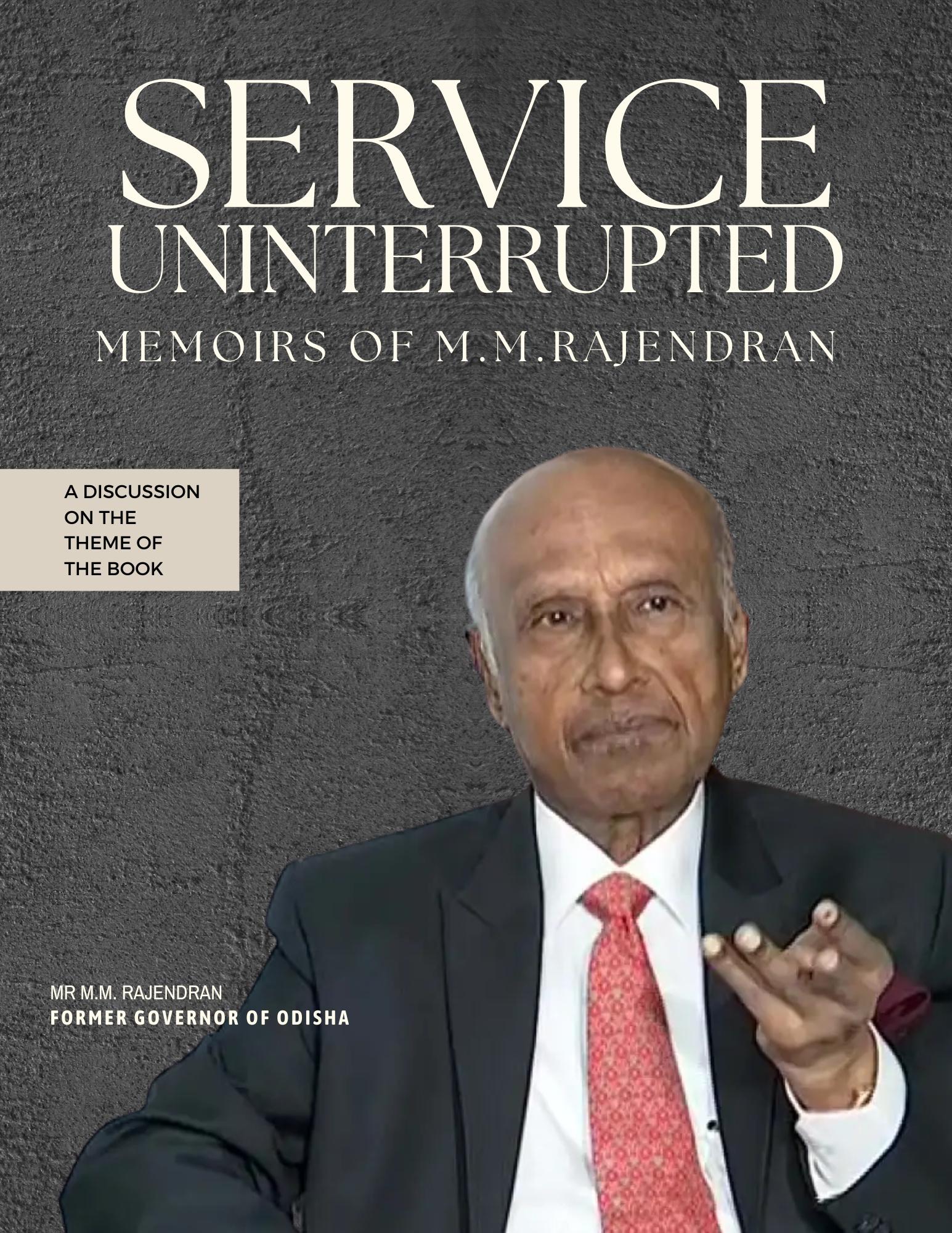
MMA‐KAS organised a Discussion on the theme of the book, “Service Uninterrupted: Memoirs of M M Rajendran” authored by Mr M.M. Rajendran, IAS ﴾Retd﴿, Former Governor of Odisha Hon'ble Mr Justice R Suresh Kumar, Madras High Court, was the Chief Guest
Dr T V Somanathan, IAS, Finance Secretary, Government of India felicitated the author through a video message. Mr H.H. Nawab Mohammed Abdul Ali, Prince of Arcot, Chennai, Ms Mallika Srinivasan, Chairman & CEO, TAFE Ltd, Mr P Shankar, IAS (Retd), Former Chief Secretary of Tamil Nadu & Former Chief Vigilance Commissioner and Kalaimamani Dr Cheyon, I.B.S. (R) Publisher of the Tamil Edition, Former Director, All India Radio, shared their insights about the book and the wisdom gained through their interactions with the author. The discussion focussed on leadership and corporate governance
The author Mr M M Rajendran in his address stressed on the need for probity and integrity in bureaucracy. He thanked his mentor Mr Kamaraj for guiding him, then PM Mr Vajpayee and many other Central Ministers and Chief Ministers of Tamil Nadu who gave him a free hand and lent him great support in the execution of his assignments. Recalling his role as Governor of Orissa, he pointed out how a Governor can contribute effectively to a State within the ambit of our
Constitution and how as Chancellor, the Governor can impact higher education in the State positively
Hon'ble Mr Justice R Suresh Kumar:
MMR's father was a veterinary doctor. The hospital building needed repairs but despite representations to the authorities, there was no action. One day, the District Collector came to the hospital for treating his horse. After it was treated well, the collector asked if they needed any support MMR's father brought up the issue of repair works to the hospital. Immediately, the necessary people came and it was rectified Inspired by this quick action, MMR’s father told his son how powerful the post of a Collector was and exhorted him to study IAS.
MMR joined the IAS passing out as an All India Topper. There was no IAS coaching facility then. He was posted in Thanjavur as a Trainee Sub-Collector. After
evaluating his performance, the then Thanjavur Collector sent a note to the Chief Minister, recommending that MMR be given an elevated responsibility and made in charge of a prominent division, preferably Pollachi, as MMR is passionate about rural development. Mr Kamaraj was the then Chief Minister He assigned Sivakasi to MMR as its first sub-collector, for two reasons It was much more of a rural area than Pollachi and Virudhunagar which was in Sivakasi division was the town from which Mr Kamaraj hailed That led to the development of a close bond between Kamaraj and MMR
For his next posting, MMR opted for Ramanathapuram, which was a very backward area and where people dreaded to go Good leaders take challenging assignments and thrive in them He handled the role deftly and it was the only district where there was no fatality from the police shooting done to curb violent crowds protesting against Hindi imposition in the State (known as Hindi agitation)
He also handled another major catastrophe a super cyclone (The Rameswaram and Dhanushkoti cyclone) that devastated the district and made one train to submerge in the sea. There was no communication and road facilities The entire Dhanushkoti was devastated and went under the sea MMR stood like a rock, contacted people at Chennai, requested for planes and helicopters and relief aid, went to ground zero, though officials advised him against going to the deep pockets of the affected areas. Amidst heavy rains and wind, he went by boat and oversaw the rescue efforts.
MMR served as collector of Tirunelveli district for three years When that tenure was over, there was a big crowd of people at the railway station, who had gathered there to send him off, with moist eyes. Again, this was top leadership in action, who connected with the people and did yeoman service
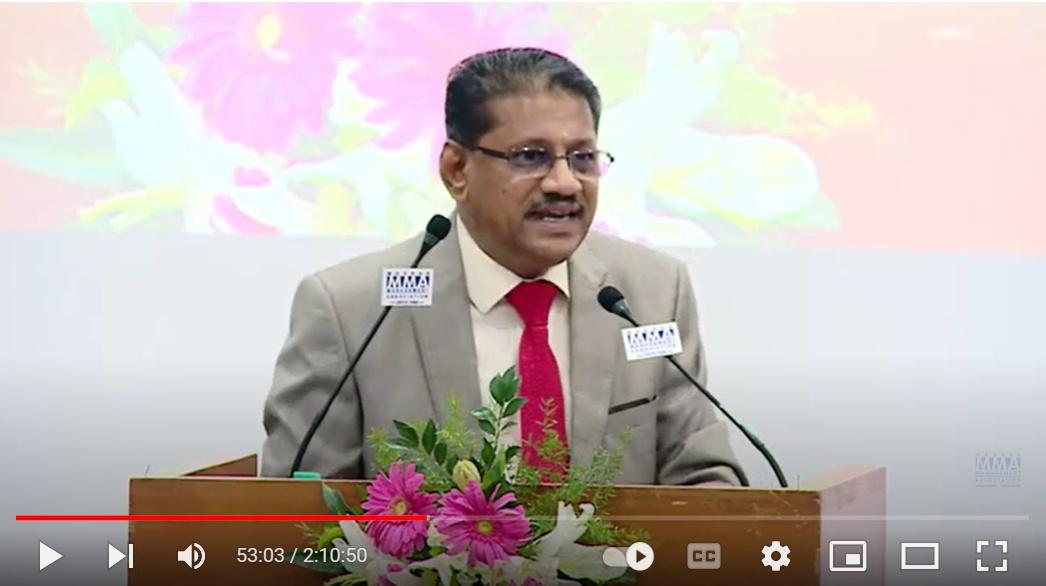
As Under-Secretary in PWD, he shifted the Republic Day Parade venue from Island grounds to Kamaraj Salai (Beach area). This practice continues till today. As Assistant Commissioner of Chennai, he did remarkable service As Commissioner of Stationery Printing, he resolved a huge labour problem The Siruvani water scheme that provides water for Coimbatore and nearby areas was conceived and executed by none other than MMR, when he was PWD Secretary
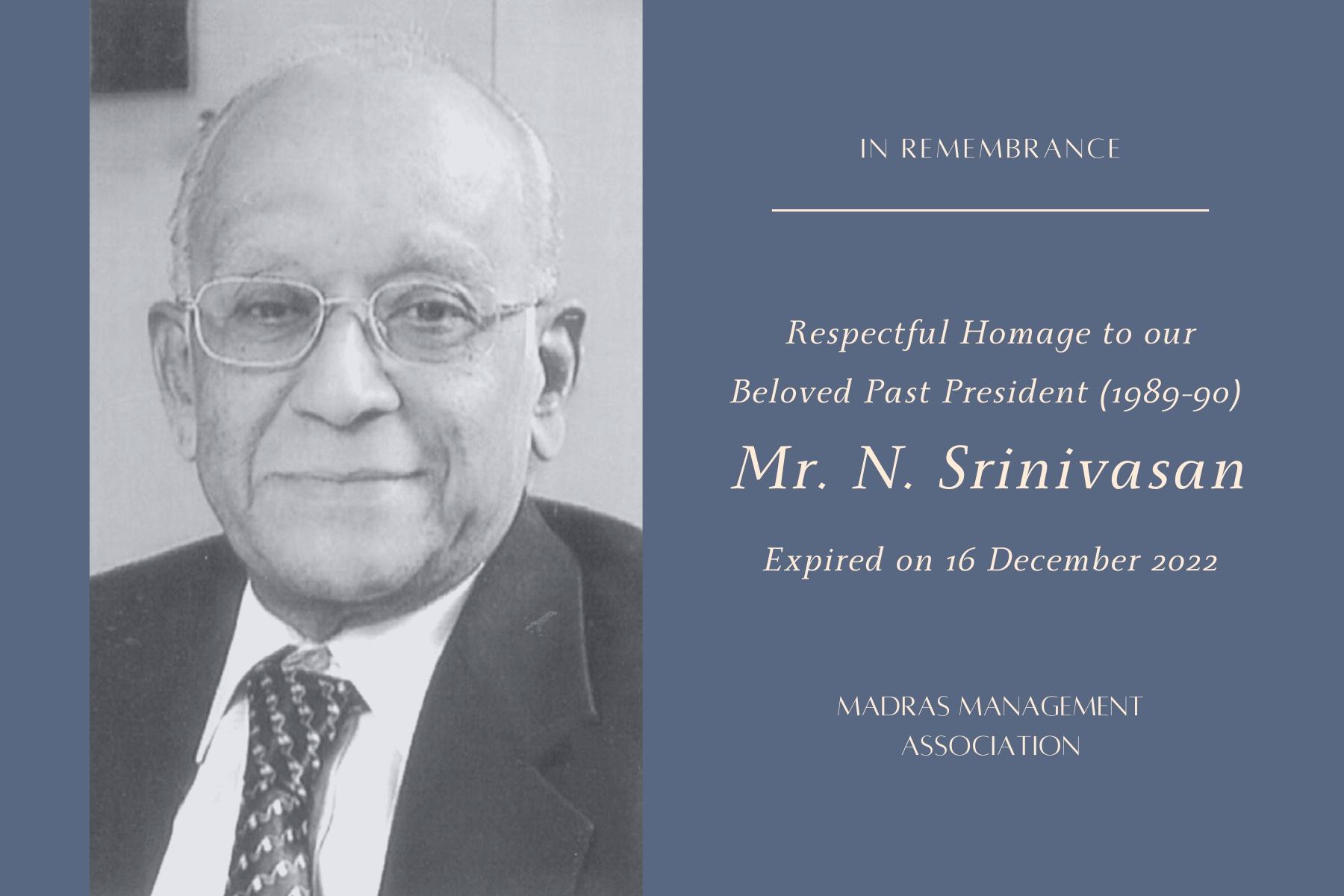
In 1988, Tamil Nadu came under President's Rule MMR was the Chief Secretary of the State and he was the main pillar of the administration. His achievements during that phase and under the subsequent elected government were far too many
During his stint in the Central Government, he initiated a nutritional development program for children It was noticed by UNICEF and they wanted
MMR's services In 1981, he joined UNICEF as a Senior Advisor and served there for six years In 87, he came back as Chief Secretary of Tamil Nadu. He again took up Central Service and could have become the Cabinet Secretary but that post eluded him
But God did not let him down. He got the coveted position as the ruler of a State the Governor of Orissa in 1999, a post very rarely given to bureaucrats. He guided the elected government there to organise relief efforts when an unprecedented super cyclone struck the state The then Prime Minister Atal Bihari Vajpayee greatly valued his cyclone relief efforts. This shows that when the leader works selflessly, keeping only the interests of his people in his/her mind and delivers effectively, he gets noticed at the highest level and rewarded for the contributions.
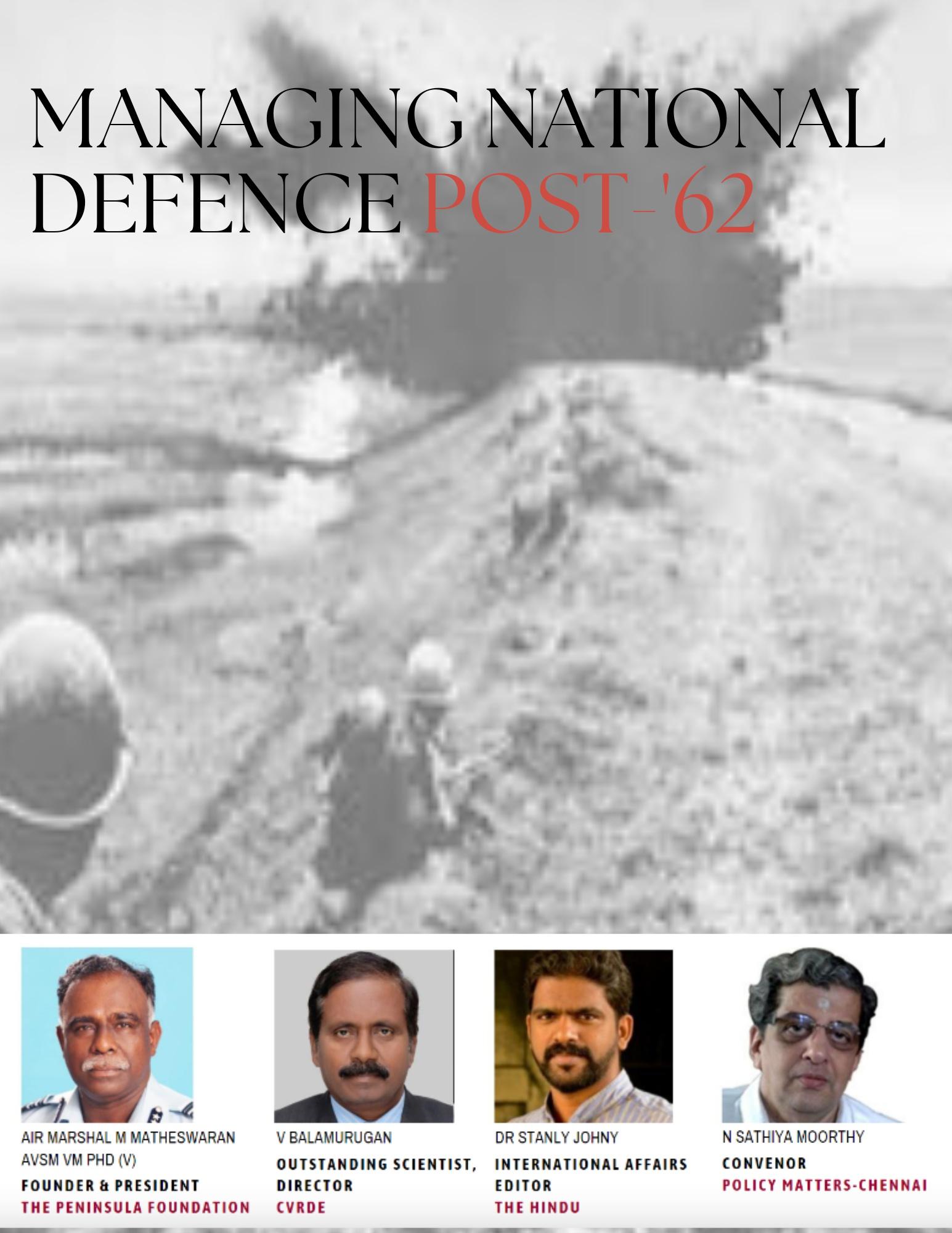
Air Marshal M Matheswaran, AVSM, VM, PHD ﴾V﴿, Founder & President, The Peninsula Foundation; Mr V Balamurugan, Director, Combat Vehicles Research and Development Establishment ﴾CVRDE﴿; and Dr Stanly Johny, International Affairs Editor, The Hindu, shared their expert views on the theme The session was chaired by Mr N Sathiya Moorthy, Convenor, Policy Matters – Chennai
When we talk of National Defence, 1962 is a milestone. In ‘62, we lost the war. When a nation loses a war, the accountability goes right up to the top leadership And in history, no leadership has ever been spared by any country when they lose a war. Nehru, the architect of independent India, who set very strong foundations on various important strategic areas was heartbroken in 1962 after the war. He wrote to John F. Kennedy on November 19, one day before the Chinese declared ceasefire, requesting assistance to save India So ‘62 was a disastrous milestone in the Indian history
There are many reasons for why it happened. There are a few important quotes from well-known scholars and practitioners One is Clausewitz, who says, ‘war is
politics by other means.’ So political leadership, must be well versed in the issue of war and policy. The other person is a Roman general called Vegetius, who almost 2000 years ago said that ‘if you want peace, prepare for war.’ If you put these two together, your strategy is well built up. If a country goes through achieving its objectives, without fighting a war, then it has actually done its job That's what Sun Tzu says: Achieving your objectives without fighting a war is the best way to resolve a conflict or win over your adversaries.
What went wrong in ‘62? If you read Nehru’s Discovery of India, you will very clearly understand that his ambition for India was to be a leader in the international order. India was a young country that was put together in 1947 as a modern nation state and an ancient civilization. Many others including Gandhi said that India has a place at the top on the international road But that was a paradox Nehru was also a realist Therefore, on the advice of Homi Bhabha and the others, he laid the foundations for India’s nuclear and space capability and defence industrial space, along
"The political nature didn't even understand the nuances and difficulties of the border terrain."
with Krishna Menon, whom we all abuse for much of what went wrong in 62.
There were certain fundamental flaws They all believed that India will not initiate war with anyone. It doesn't desire to covet anybody else's territory. Therefore, they thought that we needed to have minimal capability They didn't read Vallabhbhai Patel's warning. China was declared as PRC on October 1, 1949. Within one month, Xinjiang was occupied and within six months, Tibet was occupied That was the clear indication. But they didn't read that. Therefore, the military was not very well prepared and it was ill equipped for the border regions The political nature didn't even understand the nuances and difficulties of the border terrain. So when ‘62 happened, we were completely shattered.
We could have still not lost the war if we had used the capabilities of the Indian Air Force that existed at that point of time. With the air power that was
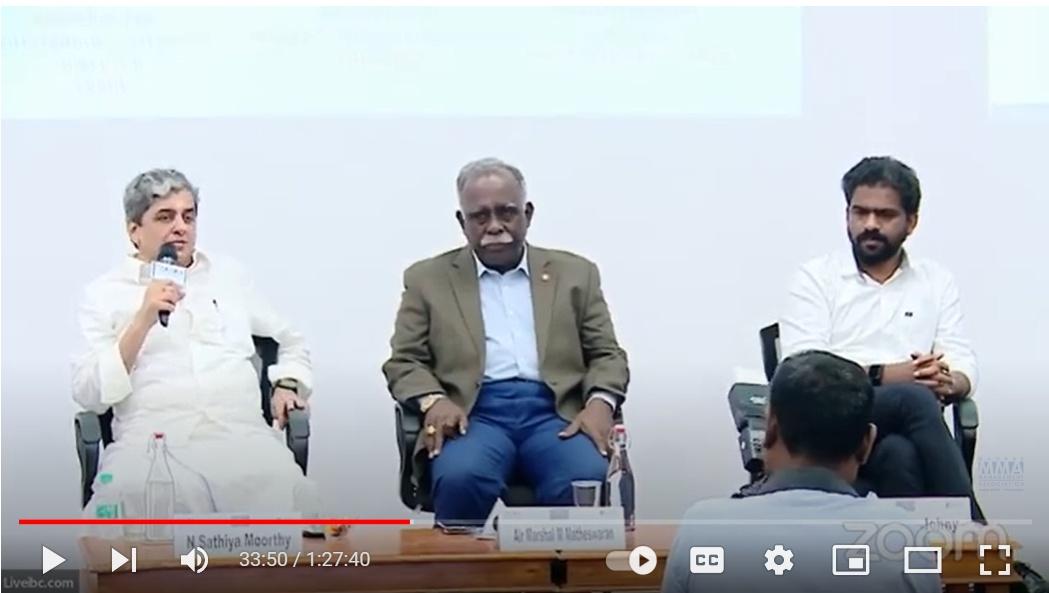
available, we would have made a mincemeat out of it The Chinese withdrew after November 19, simply because the logistics and the winter would not have enabled them to stay there The Chinese Air Force or the PLA Air Force in the 60s had no reach anywhere into the higher regions of Tibet. We didn’t use our air power, other than for airlifting a few people These were fundamental strategic mistakes
Post-62, we woke up and turned around the way we looked at defence The first was beefing up the numbers and the weapons in the Indian military. From less than 200,000, today we are 1.1 million in the army alone The three services put together, we are 1 4 as the third largest military in the world There was a rapid build-up of military capability in terms of production of equipment and arming the military.
By 1964, Nehru died and Lal Bahadur Shastri who succeeded him as PM was not very well judged by others. Pakistan’s Ayub Khan thought Shastri would be
inexperienced They tested the waters in the Rann of Kutch in April and May and then launched the Operation Gibraltar in ‘65 September. Here was the mettle of a leader, who on the advice of the military, instead of limiting ourselves to J&K, took the battle to the adversary and opened the attacks on the international border. We were a few miles away from Lahore in the latter part of September. But once again, as an excellent strategic decision, we stopped The Pakistani designs were defeated. They didn't get anything that they wanted. Military professionals see it as a stalemate Then followed the Tashkent agreement and Shastri’s death and India decided to get back to the pre-war lines. That, I would say, was a strategic mistake.
The finest of them all
1971 was one of the finest executed wars in the military history of the world. We had a political leadership that was extremely savvy Indira Gandhi was the best leader we could have had at that point of time She was realistic and ruthless. She had a diplomatic core that advised her quite well. She had an exceptional military leadership Manekshaw, PC Lal and Chatterjee We prosecuted a war at the time of our choosing and we created conditions to shape the battlefield the way we wanted to. We also shaped the international system by signing the friendship treaty with the Soviet Union in August and shaping the UN Security Council to our advantage, for the period that we wanted. We had diplomacy, political leadership and military strategy working beautifully in this entire process This was an exhibition of Indian political leadership rising to the occasion when required.
Without technology, national defence is incomplete The international order is a ruthless one When we aspire to be great power, the existing hegemony wants
to retain the status quo They don't like a rising power and so economic barriers and technology denials will work against you. You will be targeted in a post 1945 nuclear world, if you want to go nuclear. Deterrence was an extremely important requirement
Indira Gandhi’s decision to go nuclear in 1974 was an extremely brave decision But thereafter, we had weak links. We should have followed it up consistently post-74. But our economic situations and weak technological base did not give enough confidence to the political leadership Therefore, post-74, though we had a lot of imported military weapons and capability and our military was extremely fit and battle ready, as a nation which wanted to be a rising power, we were weak That took a long time and we paid a lot of penalty for that.
Post-Indira Gandhi, everyone had a role in our development process, including Rajiv Gandhi, Narasimha Rao and Vajpayee When the Vajpayee government in 1998 went ahead and declared ourselves a nuclear weapon state, the government was ready with multiple strategies We knew how the existing hegemony would come at us and we dealt with it successfully. This is a fine example of managing the National Defence extremely well Today, the same people who didn't want us to go nuclear, have given us exemption from NPT.
What matters in today's world in defence is control over critical technologies. We hear ‘Make in India’ and ‘Atmanirbhar Bharath’ in a big way. We've created a strategy that worked well and achieved our objectives in atomic energy and space But in the other dimensions of defence technologies and defence industrial base,
private sector entry was banned for a long time due to a flawed policy It was opened up only later, after 2001 Notwithstanding that, the defence of a nation depends on its economic strength in the 21st Century. Those who dominate world market will be leading the military paths The Ukraine war is a fight between the US and its allies to retain the economic control of the world. If we want to be a great power, we cannot be second fiddle to anybody We need to have critical technologies in our control.
That was, in fact, the French strategy Post-1945, they saw the writing on the wall for the international system that the US would be the world leader and the rest would have to play second fiddle. They were not willing to do that So arms, military industry and arms exports became an extremely important critical element of French economy. By 1960s, they wanted to export arms to 100 countries and they achieved that Today, France is capable of making every critical technology within that country. It's not dependent on anybody. When you create that capability, you can buy from anyone You can globalize and be interdependent This is where we missed the opportunity and are trying to correct now. It's not enough to have slogans but we have to go beyond that.
Military capability or national defence is dependent on the interface between four verticals which are a) the military or the defence; b) the industry; c) research and development and d) the academia. They all should be integrated. Last week, I was in Coimbatore and interacted with the teachers I was horrified to hear that there are colleges that are dropping disciplines of Physics and Mathematics because students are not
opting for it When a country doesn't have fundamental sciences taken up by the students, it has a serious problem. This is the main area that we should be addressing in the context of our national defence strategy
Of course, we are capable of defending ourselves 1962 can never happen again. We can bring in our local superiority against the Chinese in the areas that they can threaten us We can sort them out I consider Pakistan as a nuisance and we know how to deal with them. It's not easy for China to create a two-fronted sight. But if it creates that, we will have a serious issue because we are not modernizing at the rate that we want to The Air Force today is at 32 squadrons as against the requirement of 45. These are issues of concern which we need to do address.
R&D is one of the pillars of critical technology CVRDE is the Combined Vehicle Research and Development Establishment. Post-1962, we went for licensed production of Vijayanta tank at Avadi. Prior to that, there was no R&D lab at Avadi We found a unit from Ahmednagar and then subsequently it was made as a detachment and set up as a full-fledged lab. In the summer of 1975, it was redesignated as Combat Vehicle Research and Development Establishment
In CVRDE, Atmanirbhar is not just a word. It is being implemented practically. Between 1975 and now, Arjun Main Battle Tank (AMBT)–Mark I has been developed for the armed forces, inducted and operationalization done. Recently, we got the order for
118 tanks of the next higher version of the AMBT-Mark
I alpha These are likely to be inducted, starting somewhere in mid of 2024. Apart from the Arjun story, we have also developed the Arjun variants. DRDO has made major contributions in the various domains
We have also made ARRV Armoured Recovery and Repair Vehicle. This has got the capability of recovering and repairing the Arjun Tank when it gets bogged down in the battlefield Based on the core competency in CVRDE in different domains, we also ventured into the LCA: Light Combat Aircraft. In that, CVRDE developed the design for aircraft mounted, auxiliary gearbox.
The bearings in the LCA were imported. We took the pain of developing the indigenous bearings of the aircraft through a vendor in Gujarat Though bearing is a small element, considering the speed in which it operates and the quality requirements, it took almost four to five years to develop it. It has been successfully introduced and will be undergoing bulk production
Now we have more requests from air force to develop bearings which have become obsolete or difficult to source
Coming back to the tank technology, we have been importing to the extent of 62% in Mark I, mainly the engine, transmission, gun control system, Gunner’s Main Sight and so on But in the last two to three years, we launched the indigenisation program by which the engine is developed with the partnership of BEML and transmission developed with the partnership of L&T. Within the next two to three years, the entire tank systems and technologies will be from within the country. With Atmanirbhar Bharat, the lifecycle support will be much better and easier to upgrade of the systems
In DRDO, we have the eight clusters working in different domains Basically for example, we have the ACE cluster from which the Pinaka multi barrel rocket system has been launched. We have the ATAX developed by our Pune-based lab It has a 48 kilometre artillery range, which no other country has achieved We have composite bridges which the army can use to cross. The Hyderabad lab is working on missiles – Agni V and BrahMos We have an air defence system made by DRDO. ASAT developed in 2019 is a remarkable development by DRDO. It is able to accurately aim and hit a satellite at lower orbit, travelling at 300 km kilometre per second
During Covid, we made a lot of contributions to the country We made ventilators which were not available then. It helped the army also. We made medical oxygen plants using the technology developed by DRDO on the lines of the oxygen generating system in the aircraft Netra AWACS developed by DRDO is being used effectively now for the country's defence preparedness. We are also developing torpedoes, sensors and sonar for tri-services, basically the Navy
DRDO has 52 labs Each one is working in its domain. Parachutes are being developed from which a heavy base can be dropped. It can also be used for the Gaganyaan mission DRDO also launched a lab called DYSL cell They have been asked to develop core technology areas like quantum computing. So the defence preparedness of the country has been enabled by DRDO in a much better way
We now have a practice of having the DcPP Development cum Production Partner, wherein we take the industries on board. The defence production
f o u n t a i n h e a d o f e x c e l l e n c e
capability of the industries will be enhanced through hand-holding by DRDO The government encourages design and R&D by private industries. The defence PSUs and DRDO are supporting them.
So between 1962 and now, the HVF at Avadi started production of Vijayanta tanks and CVRDE has gone into a bigger role of making the various tanks indigenously. After Doklam, CVRDE is developing a light weight tank of 25 tonnes with amphibious capability, meeting the requirements of the army for high altitudes. It will be air-transportable and give other benefits. We'll be rolling out a prototype in April 2023 successfully Thus we are also dynamically aligning with the requirements of defence "China wanted India to stay neutral."
Dr Stanly JohnnyThe Hindu
Much has been written about the 1962 War. Over the last 60 years, India and China have evolved a great deal China is now the world's second largest economy They have built the world's largest navy. They are a big military power, which is almost on the brink of triggering another Cold War with the United States, which remains the world's most important military and economic power.
India is now the world's fifth largest economy. We are a nuclear power, unlike in 1962 India has also evolved It has become a much bigger, stronger and confident economic and military power. It is expected to play a major role in the Indo-Pacific region in the coming years and decades Both India and China are nuclear powers. But despite the evolution of the
status of both countries, the friction points on the border still stay We saw that in the Galwan clashes Just a couple of weeks ago, there was another incident which appeared in the media reports, after which the defence minister talked about it in the Parliament
What went wrong in 1962? The clashes started in 1959 in Lanzhou, and other parts of the Himalayan border, which eventually led to an open war in 1962. We are still debating what triggered the Galwan clashes In my sense, China has historically looked at India, through the prism of its own rivalry with great powers. There could be different phases in China's relationship with India from 1949 to 1962; from 1962 to the end of the Cold War; and in the post-Cold War period, as Vijay Gokhale, India's former Foreign Secretary, recently wrote in the Carnegie paper
In the 1949 to ‘62 period, China wanted India to stay neutral. It appealed to India's relationship with the developing world. But in the post-‘62 period, China's relationship with the Soviet Union was collapsing on one side, and on the other side, China was warming up to the Americans in the 1960s and the 1970s. China would establish some kind of a quasi-partnership or alliance with the United States India was moving closer to the Soviet side in the 1970s. So China's focus was to draw India from the Soviet Union.
China was also exploiting India's foreign policy challenges by building stronger ties with Pakistan In the post-Cold War period, engagement started in late 1980s, with Prime Minister Rajiv Gandhi's visit to China We saw a period of engagement, tranquillity
f o u n t a i n h e a d o f e x c
and also an inclination on both sides to address the border question
There was also a period of economic engagement and trade.
But in these three phases, China looked at India through that prism of great power rivalry. Initially, in the 1949 to 1962 period, China was obsessed with the United States, then with the Soviet Union and then in the post-Cold War period, China sees the United States as its number one geopolitical rival. China looks at India as a potential counterweight to its own regional ambitions. China wants to stop India from becoming an ally of the United States.
China is perhaps using limited, low-level coercion as a deterrent tactic The message to New Delhi is that if you are moving completely to the American side, if you are going to become a pillar in the in the United States’ Indo-Pacific strategy, don't forget that you have an unsettled, undemarcated and undefined Himalayan border, running to thousands of kilometres long with us. China expects low levels of geopolitical setback for this strategy and they don't think India will become more aggressive in its response to Chinese coercion In their cost benefit or risk assessment, it could create issues in its relationship with India and tensions would rise, but at the same time, they don't expect this to explode into a full-fledged conflict between India and China.
How is India going to address this challenge? India has to emphasize the bilaterality of its relationship with China To effect a change in China's approach towards India or to look at India as a regional power, India has
to build its capacities India has already evolved a great deal, but when you do a comparison with China, there is asymmetry in terms of hard power it may be economic or military power. The focus has to be on a long-term strategy of building India's own capacities where our defence preparedness, internal cohesion and the resilience of our democratic institutions will come. Democracy is one natural advantage India has vis-à-vis China
The Chinese did the same thing. From 1949 to mid1950s, China was a Soviet ally. They were communist brothers But despite this ideological brotherhood, in the 1970s, China moved towards the United States, hosting President Nixon and Henry Kissinger. They broke away from the Soviet Union and became a quasially of the United States, which Mao called the imperial power With the United States, they wanted to contain the Soviet Union, which they identified as their primary challenge. From the 1970s, until recently, China was very much focused on building and strengthening this relationship with the United States, irrespective of its ideological convictions. Only now, after attaining the military and economic confidence under President Xi Jinping, the Chinese are directly challenging the United States. This is what the Chinese model is.
But compared to India, the United States does not share a Himalayan border with China This is one of the major challenges India will have to face India is a huge nation with a peninsular coast on the one side and a large population.
Our economy keeps growing and we have the natural potential to become a regional power The border problem is an immediate challenge, which we have to address. At the same time, we need to have a grand strategy to transform India
When do you expect India to reach a level where we can compete with China?
Air Marshal Matheswaran: We must have a clear national strategy, like France, which I discussed. In critical areas, we have no option but to create capabilities irrespective of what the cost is. Those capabilities don't come overnight. It has to be addressed in education, R&D, industrial investment, and, of course, users’ inputs. Our investments in R&D have been abysmally low But we are now moving up. If we go past 3.5% of GDP in R&D investment, it would give us a significant leap forward to address some of those issues We need to have a good roadmap. If you study China, they bought as much equipment from Russia as we have done, if not more. They monitored every weapon system that they took from Russia, reverse engineered and produced better ones of their own. Have we done that? That's the question.
If China were to attack us tomorrow, will there be hundreds of battle tanks coming across the border? What kind of battle will be happening?
War is always complex. It is ultimately all about politics. It's a political objective that defines ultimately how a war will be fought It will also depend on the capabilities. You need to retain the dominance of the narrative in the
context of the war As Stanly pointed out, I don't see a major war coming between China and India. Neither is China foolish nor is India adventurous Both are civilizational states They have tremendous political maturity. The needling by China is to keep us under pressure. We need to grow out of that and put them on the defensive and then it can be sorted out.
What is the status of our defence exports?
Balamurugan: We are already an exporter to the South Asia and recently to Arabian countries. We are trying to push a lot of things forward In another three to five years, we'll be having our own technologies in many defence areas. Regarding critical and pioneering technologies, we will develop them in another 5 to 7 years’ time and then we can export them to others. In India, we seem to lack civil-military integration. This is one of the things China achieved after Deng Xiaoping took over power. When will India achieve a civil-military integration?
Air Marshal Matheswaran: Every citizen must have an inbuilt passion to contribute to national defence. We should have started with compulsory military service As we are a huge population, the challenges are many but we could have found a solution for that In the US, those who come into critical
areas of governance be it bureaucracy or the political leadership- should have military service. This was practiced in more than 250 years of its history Of course, now things changed after Obama came. But internally, there is a lot of debate going on there.

It was mentioned that India has 32 squadrons as against the requirement of 45. Can the requirement come down if we have high quality and expensive aircrafts?
Air Marshal Matheswaran: It doesn’t work that way. The required number has its own importance. Given the environment in which we live in, given the large threats, we have to keep our powder dry and that needs a certain minimum optimal size of military forces 45 has been arrived at, based on that calculation. Technology will keep leaping forward. Despite that, those numbers are absolutely necessary
How will you rate the nation's defence preparedness?
Air Marshal Matheswaran: We are capable of handling the threats that are there around us But why do you want to be always under pressure and tension? Remember, victory is winning without war. So we must create a deterrent capability
When we take up indigenization, there is a common mindset that imported equipment is always superior. How do you handle this?
Balamurugan: When we develop indigenously, we have to meet very strict international standards. For example, when we develop an armoured fighting vehicle engine, there is a qualification cycle called NATO cycle. It has to run for 400 hours without any problem Same is the case with transmission It has to perform flawlessly and meet the international standards. We have to qualify the equipments to that kind of testing
One more advantage we have is the harsh Indian weather and
climate conditions and temperature profile We develop to 60 to 70 degrees hardening, so that they will work comfortably in India. There is no compromise on qualification and therefore, it is much better when the defence equipment comes from India If we talk about missiles, they are not available for imports We have developed all kinds of missiles such as surface to air and air to air, including the Brahmos
How do you view the foreign policy followed by the present government?
Stanly: In the first five years of
this government, there were challenges as well as engagement
In the neighbourhood, India faced a number of challenges. We faced resistance in several neighbouring countries, which have had traditionally and historically good relationship with India In its second term, the government has tried to fix some of those issues and has built again with Bangladesh, Nepal and Sri Lanka India took a very positive position in helping the Sri Lankan people during their economic crisis.
